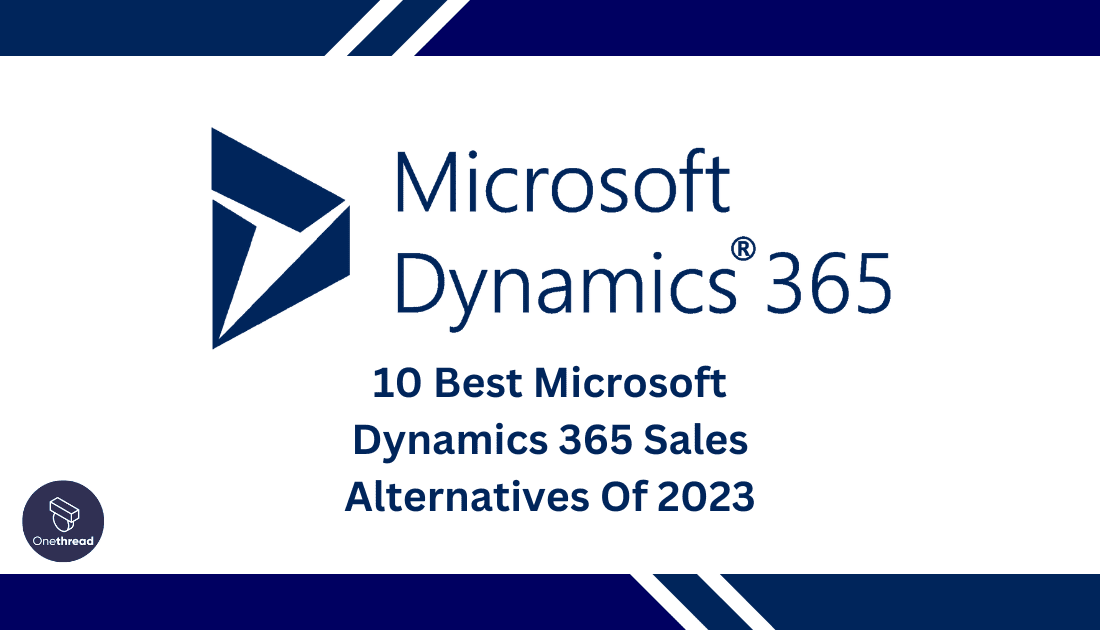Navigating through the labyrinth of enterprise software, you might have stumbled upon the all-encompassing Microsoft Dynamics 365. This comprehensive suite of business applications is admired globally for its seamless integration capabilities and transformative potential.
However, it’s like a large ocean liner, designed to serve many but may not always make the perfect fit for everyone. Therein lies the beauty of the vast enterprise software landscape, which includes a diverse array of alternatives to Microsoft Dynamics 365, each offering unique characteristics to better cater to specific business requirements.
Embark with us on a comprehensive exploration of this vibrant and varied terrain, where we will unfold a panorama of the top alternatives to Microsoft Dynamics 365. Our journey will include pit stops to evaluate each contender’s key features, strengths, and business suitability, providing you with invaluable insights to assist in the selection of your ideal business software companion.
Quicklist
- Onethread: Enterprise-grade project management solution with automation and resource management features.
- Salesforce: Intuitive project management platform with task tracking, collaboration, and customizable workflows.
- Trello: User-friendly visual project management tool based on boards, lists, and cards.
- Zoho CRM: Powerful, agile project management software with robust issue tracking and advanced reporting capabilities.
- Hubspot CRM: Versatile team collaboration and project tracking platform with customizable workflows.
- Pipedrive: Cloud-based project management software with Gantt charts and real-time collaboration.
- Freshsales: All-in-one project management tool with extensive customization options and integrations.
- SugarCRM: Collaborative work execution platform with spreadsheet-like functionality for project tracking.
- Nimble CRM: Simple and efficient project management software with to-do lists and file sharing.
- Insightly CRM: Comprehensive project management software with task management, time tracking, and reporting capabilities.
Our reviewers evaluate software independently. Clicks may earn a commission, which supports testing. Learn how we stay transparent & our review methodology
What Is Microsoft Dynamics 365?
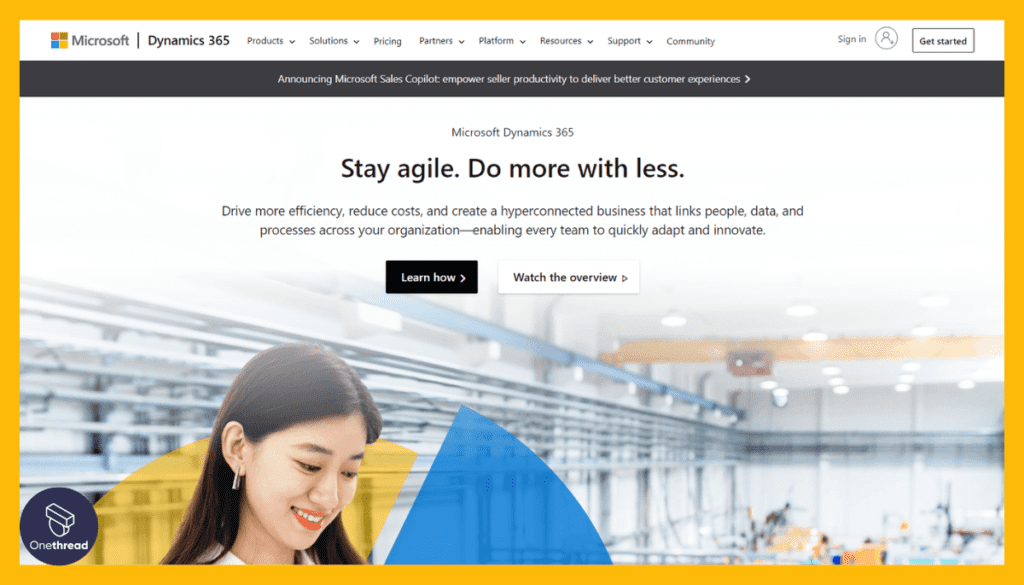
Microsoft Dynamics 365 is a suite of business applications. It combines Customer Relationship Management (CRM) and Enterprise Resource Planning (ERP).
The suite includes tools for sales, marketing, service, finance, and operations. It helps businesses manage and analyze data.
Microsoft Dynamics 365 is a cloud-based solution. This means you can access it from anywhere with an internet connection. It offers flexibility and integration with other Microsoft products.
Dynamics 365 helps businesses improve efficiency and make better decisions. It can be customized to fit a company’s unique needs.
If you want to maximize the platform’s potential, you can hire Dynamics CRM developers to tailor it specifically to your business processes.
Reasons To Consider An Alternative To Microsoft Dynamics 365 Alternatives
There are several reasons why a business might consider alternatives to Microsoft Dynamics 365, even though it is a widely used and robust customer relationship management (CRM) and enterprise resource planning (ERP) solution. Here are some starting points to consider:
High Costs
The high cost is one of the most common reasons businesses look for alternatives to Microsoft CRM. The total cost of ownership can be expensive, especially for small and medium-sized businesses, as it includes licensing fees, implementation costs, and ongoing maintenance expenses.
Complex Implementation Process
Implementing Microsoft Dynamics 365 can be a complex process requiring significant time and resources. It may also require the involvement of IT specialists or consultants.
Need for Simpler Functionality
Microsoft Dynamics 365 offers a comprehensive suite of applications, which, while powerful, might be more than some businesses need. Alternatives may provide simpler, more streamlined functionality that better aligns with the requirements of smaller organizations or those with less complex operations.
Customization Limitations
While Microsoft Dynamics 365 offers a high degree of customization, these capabilities might still fall short for businesses with highly specific or unique needs. Users with other needs might look for another option that fits their particular use case.
Limited User-Friendly Experience
Although Microsoft Dynamics 365 is a robust and comprehensive solution, it is sometimes criticized for its lack of user-friendliness. Navigating through the suite can be complex and overwhelming, especially for new users.
Incompatibility with Existing Systems
Finally, while Microsoft Dynamics 365 offers integration with other Microsoft products, it may not integrate as seamlessly with other third-party applications or systems that a business already uses.
Top 10 Microsoft Dynamics 365 Alternatives Competitors: Comparison Chart
Here’s a basic comparison chart based on their features and capabilities:
Tool | CRM Functionality | Sales Automation | Reporting & Analytics | Customer Support |
 | Comprehensive CRM Suite | Lead & Opportunity Mgmt | Advanced Analytics & Dashboards | 24/7 Support & Training |
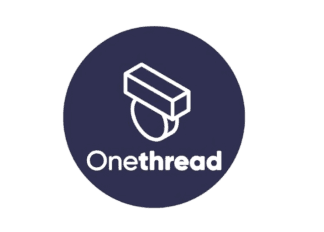 | Customizable Workflow that can be used as a CRM | Workflow Automation | Weekly reports, timesheets | Email & Chat Support, Resources and guides |
 | Full CRM with AI Capabilities | Sales Process Automation | Customizable Reporting | 24/7 Phone Support |
 | N/A (Not a CRM) | N/A | Basic Analytics | Community Support |
 | Complete CRM Solution | Sales Tracking | Real-time Analytics | Phone & Email Support |
 | Free CRM with Essential Tools | Lead Tracking | Built-in Analytics | Knowledge Base & Forum |
 | Sales-focused CRM | Deal Management | Sales Forecasting | Live Chat Support |
 | Sales CRM with Email Tracking | Automated Sales Campaign | Analytical Dashboard | 24/7 Email Support |
 | Customizable CRM Platform | Sales Automation Suite | Advanced Reporting | Phone & Knowledge Base |
 | Simple Contact Management | N/A | Performance Analytics | Community & Email |
 | Relationship-focused CRM | Opportunity Management | Insightful Analytics | Email & Community |
Top 10 Microsoft Dynamics 365 Alternatives For Your Project Management Needs
Finding the right project management tool is crucial for businesses looking to streamline their processes, enhance collaboration, and achieve project success. While Microsoft Dynamics 365 is a popular choice, there are other powerful alternatives available in the market.
Here, we’ll explore 10 top Microsoft Dynamics 365 alternatives that offer comprehensive features, user-friendly interfaces, and flexible pricing plans to meet your project management needs.
1. Onethread
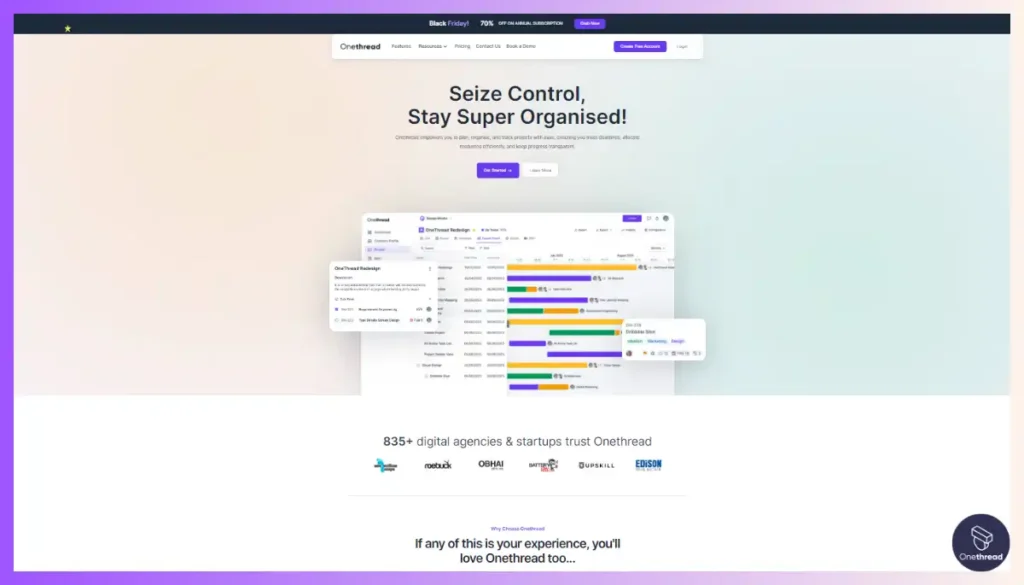
Onethread is an all-inclusive project management and collaboration platform designed to help businesses manage their tasks, workflows, and teams efficiently.
With its cloud-based technology, Onethread offers a variety of features that streamline project management and increase productivity.
From task scheduling to communication tools, time tracking, and real-time reporting, Onethread ensures a comprehensive project management solution that can cater to organizations of all sizes and industries.
Key Features
Task Management
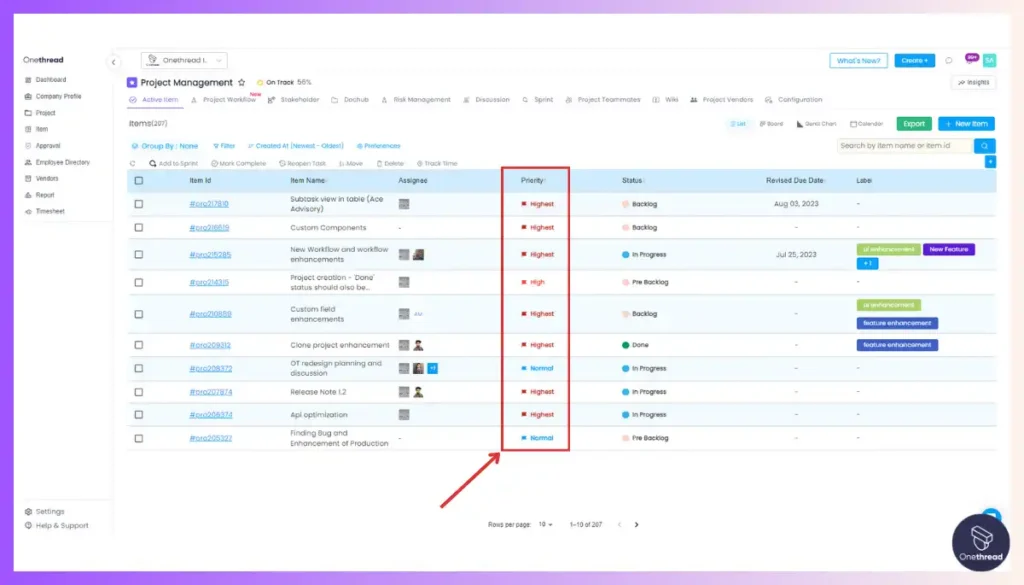
Onethread allows you to create, assign, and track tasks, ensuring all team members know what they need to do and by when. Its intuitive task management system can prioritize tasks based on importance and deadlines.
Real-time Collaboration
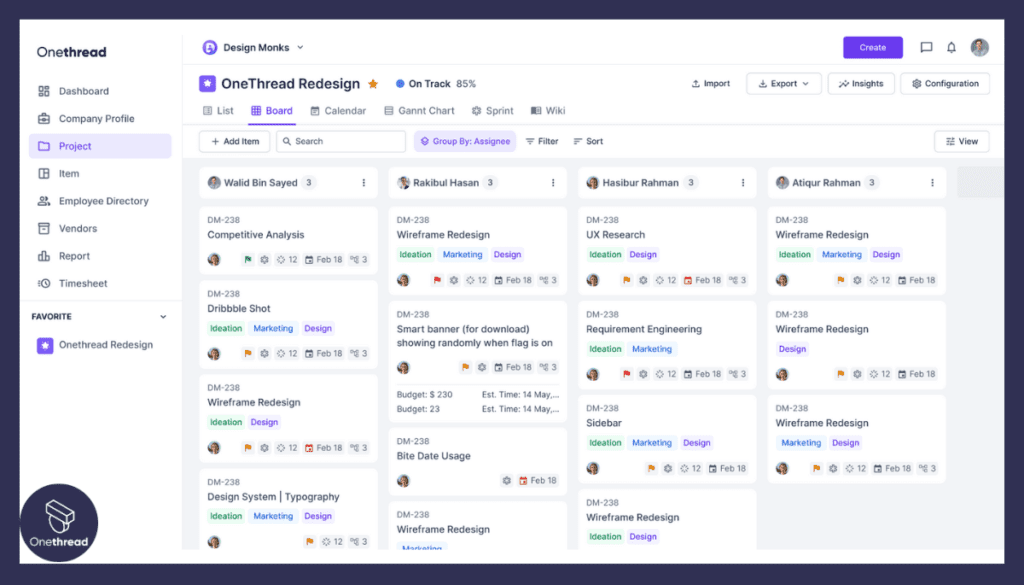
With built-in chat, file sharing, and commenting capabilities, teams can collaborate in real-time, fostering a cohesive and efficient work environment.
Time Tracking
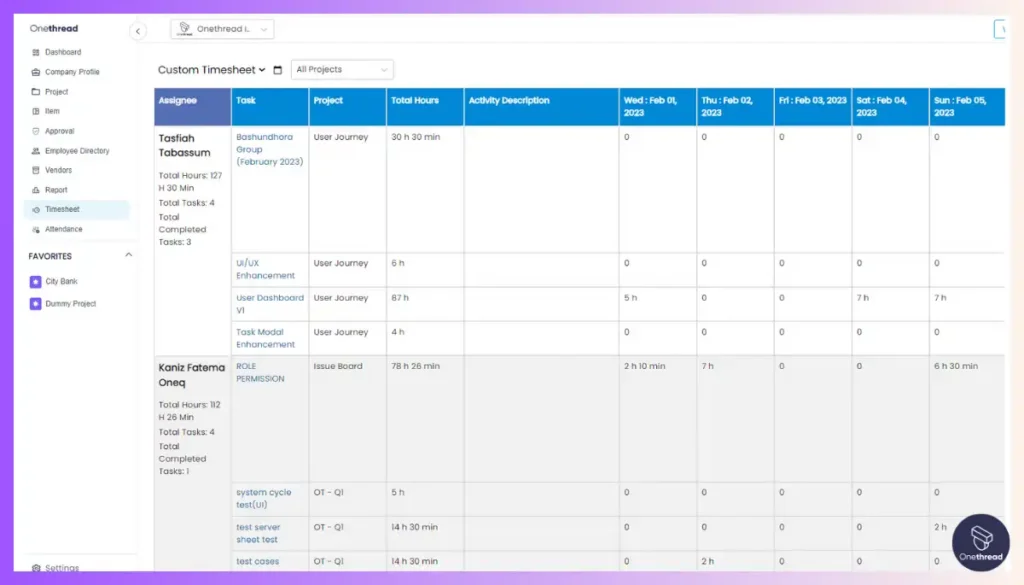
It provides an efficient time tracking tool that allows you to record the time spent on each task, ensuring accurate project timelines and better productivity assessment.
Reporting and Analytics
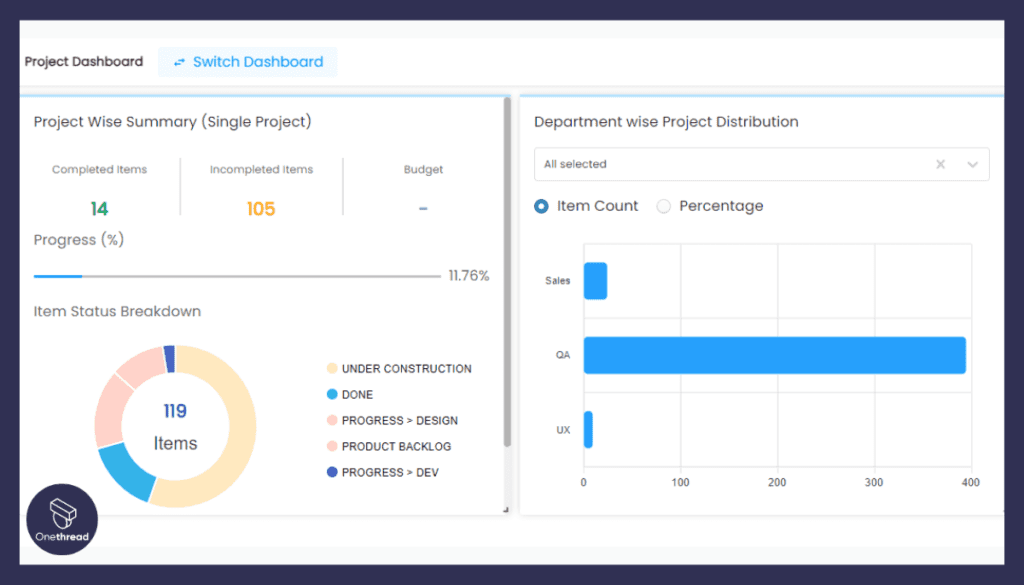
Onethread offers powerful reporting and analytic tools that provide comprehensive insights into project performance, helping teams to make informed decisions.
Workflow Automation
It automates routine tasks and workflows, allowing teams to focus more on productive work.
Best Use Case
Onethread is best suited for mid-to-large size organizations with complex projects involving multiple teams that need to streamline their project management process.
Its real-time collaboration feature makes it an excellent choice for distributed teams or companies that work remotely. Moreover, its robust reporting and analytics tools make it ideal for organizations that require data-driven insights to optimize their project performance.
Pros and Cons
Pros:
- User-friendly interface: Onethread offers an intuitive and easy-to-navigate interface, which makes it easy for users to get started.
- Real-time updates: Onethread ensures that all team members stay updated with the latest changes in the project through real-time updates and notifications.
- Excellent customer support: Users have praised the platform for its responsive and helpful customer support.
Cons:
- Limited customization: Some users have mentioned that the tool lacks customization options for reports and dashboards.
- Learning curve: Although its interface is user-friendly, new users may face a learning curve to understand all its features.
Pricing Plans
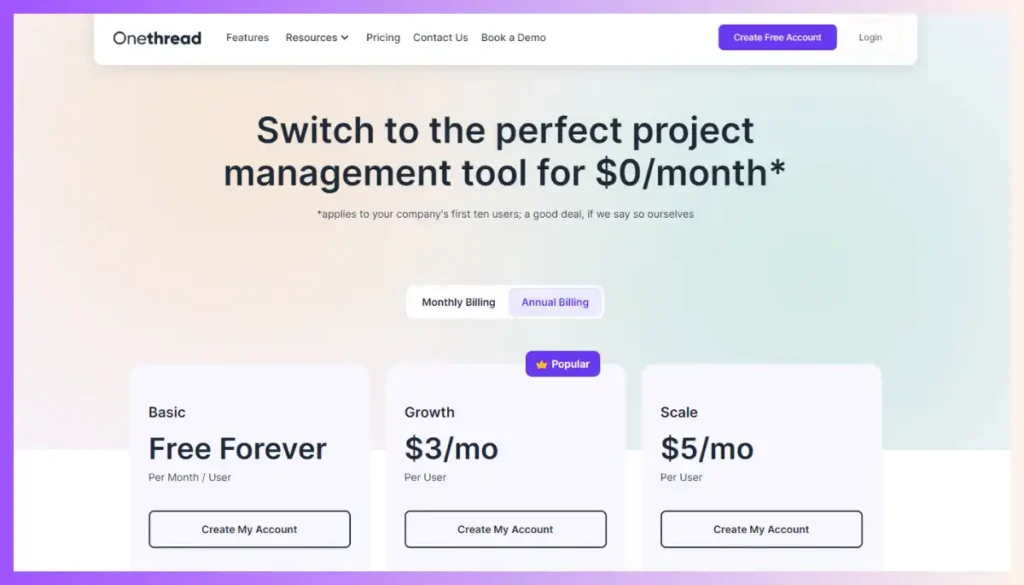
Onethread offers various pricing tiers to suit different needs:
- Free: Limited features, suitable for small teams.
- Growth Plan: Priced at $3.6 per user per month, offering advanced features like unlimited tasks, file sharing, and priority support.
- Scale Plan: The Scale Plan ($6.00) is designed for large or rapidly expanding businesses, offering the full range of Onethread’s features without limitations.
Onethread is a robust alternative to Microsoft Dynamics 365 for project management needs. Its extensive features and various pricing plans make it adaptable to different business sizes and requirements.
Why Should You Choose Onethread Over Microsoft Dynamics 365?
Here’s a comparison chart highlighting some of the key differences between Onethread and Microsoft Dynamics 365:
Feature | Onethread | Microsoft Dynamics 365 |
Comprehensive CRM Suite | ✓ | ✓ |
Customizable CRM Features | ✓ | ✗ |
Lead & Opportunity Management | ✓ | ✓ |
Analytics & Customized Dashboards | ✓ | ✓ |
Workflow Automation | ✓ | ✗ |
24/7 Support & Training | ✗ | ✓ |
Visual Reporting Tools | ✓ | ✗ |
Community Support | ✓ | ✗ |
2. Salesforce CRM
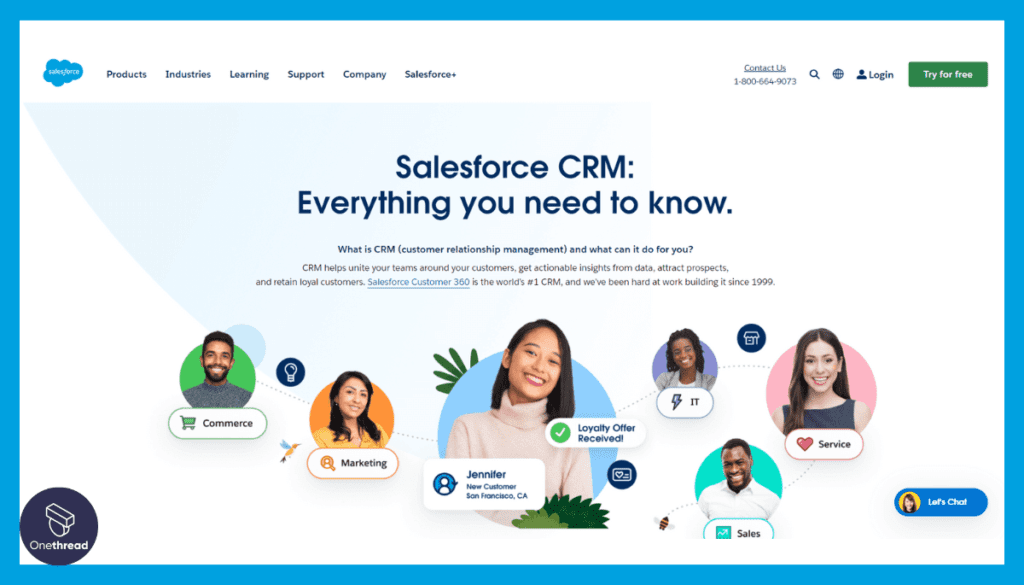
Salesforce CRM is a leading cloud-based customer relationship management platform that helps businesses connect with their customers in a whole new way. It offers a suite of tools for sales automation, marketing, customer service, and analytics.
Salesforce CRM enables organizations to track all customer interactions and information in one centralized place, providing a 360-degree view of each customer. Its artificial intelligence capabilities deliver insights and automation across the entire business process.
Integrating seamlessly with various third-party applications, Salesforce CRM offers flexibility and scalability to fit different business needs, making it a preferred choice for companies of all sizes. Its user-friendly interface and extensive community support further enhance its appeal.
Key Features:
Comprehensive Integration
Salesforce offers integration with a wide array of third-party applications, including email platforms, social media, and various other tools. This makes it possible for businesses to connect different parts of their workflow within one platform.
Strong Customer Support
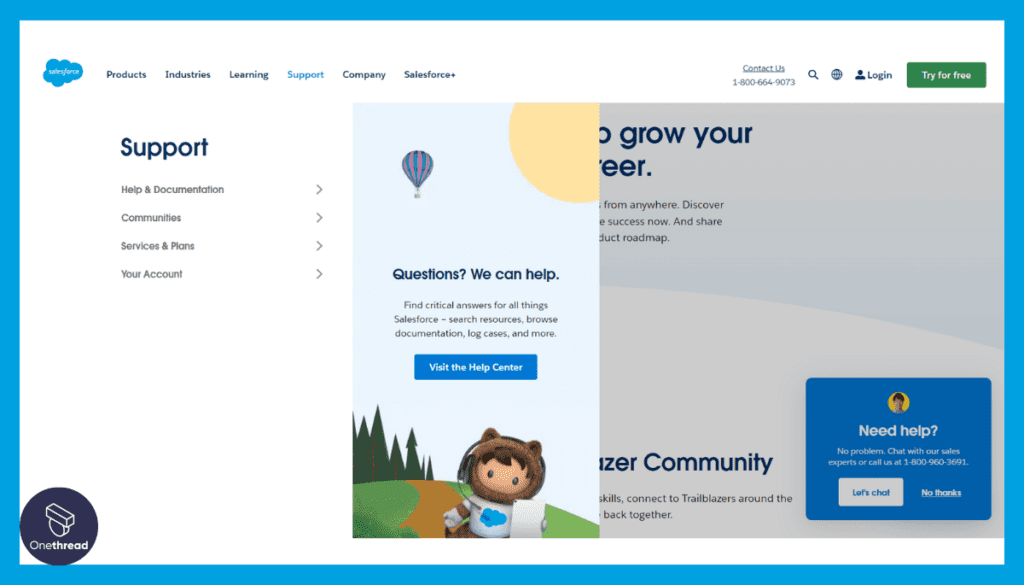
With an emphasis on customer satisfaction, Salesforce provides robust support with 24/7 availability, a knowledge base, community support, and dedicated account managers for larger clients.
AI-Driven Insights
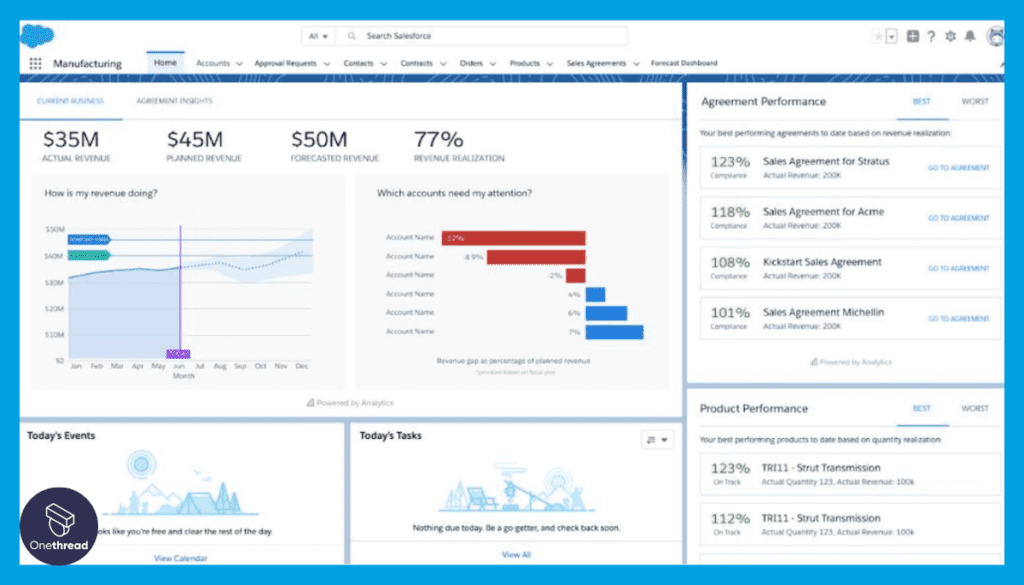
Leveraging the power of AI, Salesforce provides actionable insights based on customer data. This helps businesses to make data-driven decisions and create personalized customer experiences.
Customizable Dashboards
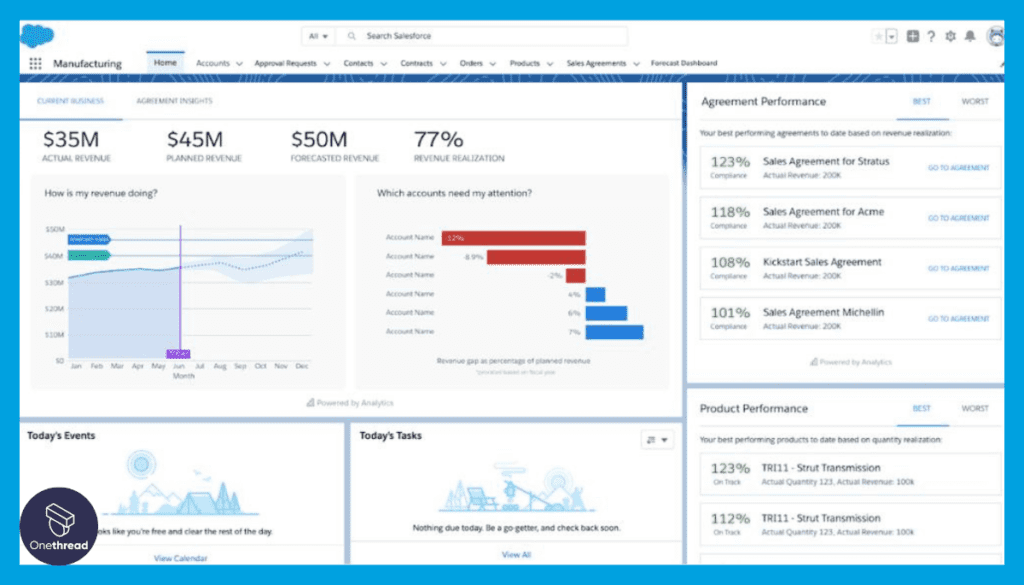
The platform allows users to create customized dashboards that can track various metrics, KPIs, and data trends specific to their business needs.
Pros & Cons
Pros
- Highly flexible and customizable
- Robust integration capabilities
- Excellent customer support
- Comprehensive analytics
Cons
- Can be complex for new users
- May be expensive for small businesses
- Requires training to leverage full functionality
Pricing Plans:
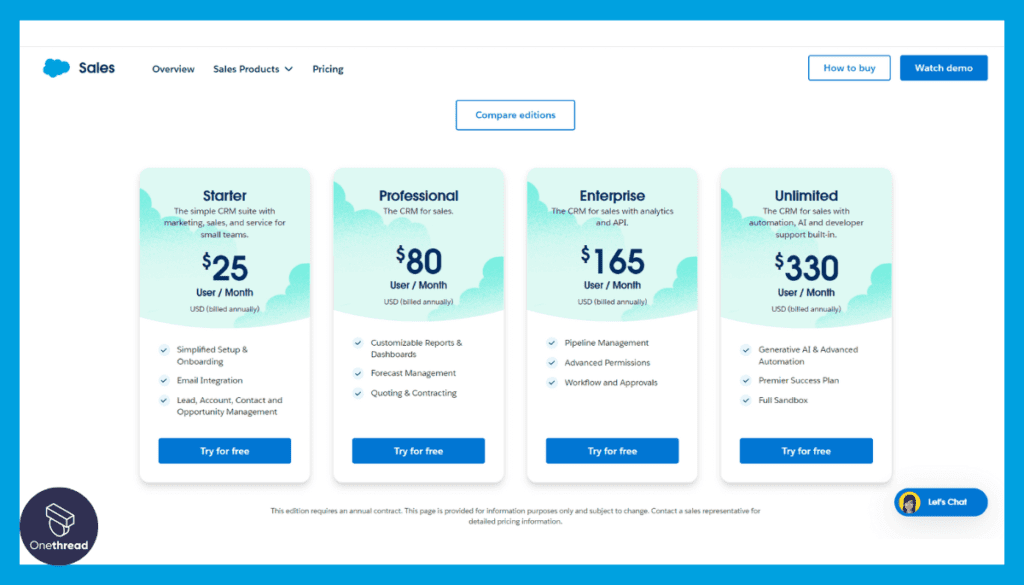
Salesforce offers different pricing plans ranging from the Essentials plan at $25 per user/month to the more advanced and feature-rich Unlimited plan at $300 per user/month.
Customer Rating
- G2: 4.2 out of 5
- Capterra: 4.3 out of 5
User Review
Salesforce CRM is hailed for its extensive features, integration capabilities, and customer support. Many users appreciate its robust analytics and customization options. However, some reviews point to a steep learning curve and the cost factor, particularly for smaller businesses.
As an alternative to Microsoft Dynamics 365, Salesforce CRM offers a rich set of features and benefits that cater to various business needs. Its strengths in integration, customer support, and AI-driven insights make it an attractive option for those looking for a comprehensive CRM solution.
Is Salesforce CRM Better than Microsoft Dynamics 365?
Salesforce CRM and Microsoft Dynamics 365 serve different purposes. Salesforce is a comprehensive CRM system that helps businesses manage customer relationships, sales, and marketing. Microsoft Dynamics 365, on the other hand, is a time-tracking tool designed to monitor and analyze work hours.
Comparing them directly may not be appropriate as they cater to diverse business needs and functions. The choice between them depends on whether a business requires CRM functionalities or time management capabilities.
3. Trello
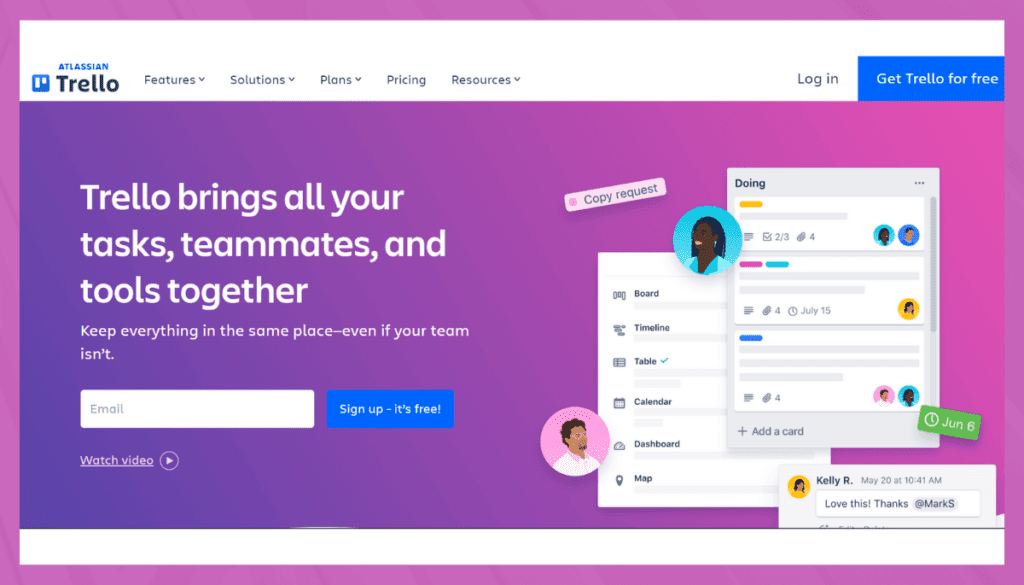
Trello is a visual collaboration tool that helps teams organize their projects into boards, lists, and cards. With its intuitive drag-and-drop interface, users can easily track progress, assign tasks, and set due dates.
Trello offers customizable workflows, enabling teams to adapt the tool to their specific needs. Integration with various third-party apps enhances its functionality, allowing for a more connected and seamless work process.
Whether managing a complex project or organizing daily tasks, Trello’s simplicity and flexibility make it suitable for both personal use and professional teams. Its real-time updates and cloud-based access ensure that all team members can collaborate efficiently, regardless of location.
Key Features:
Visual Project Management
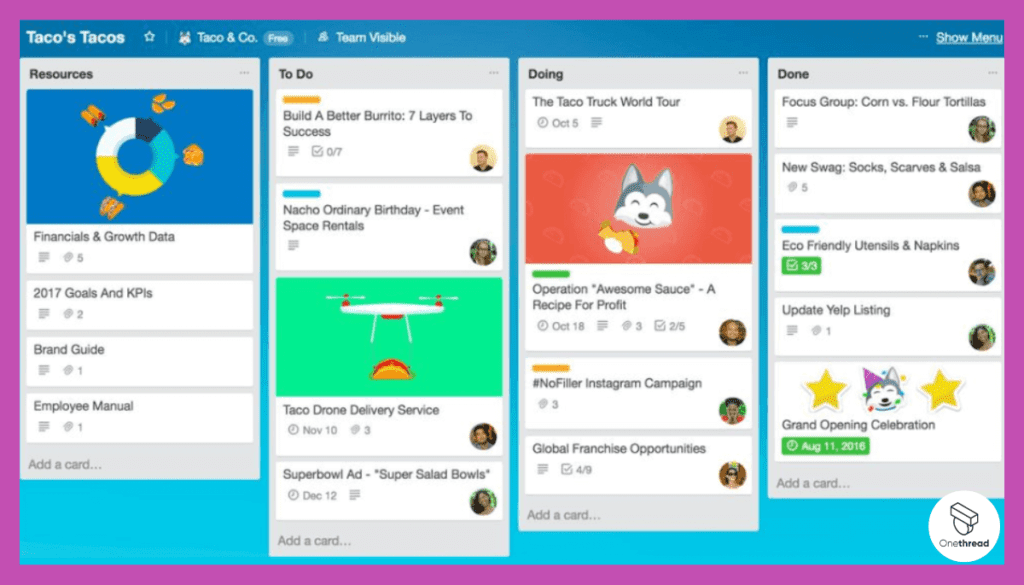
Trello uses a card-based system that lets users move tasks across different stages of a project. It’s highly visual and intuitive, making it easy to see the status of a project at a glance.
Collaboration
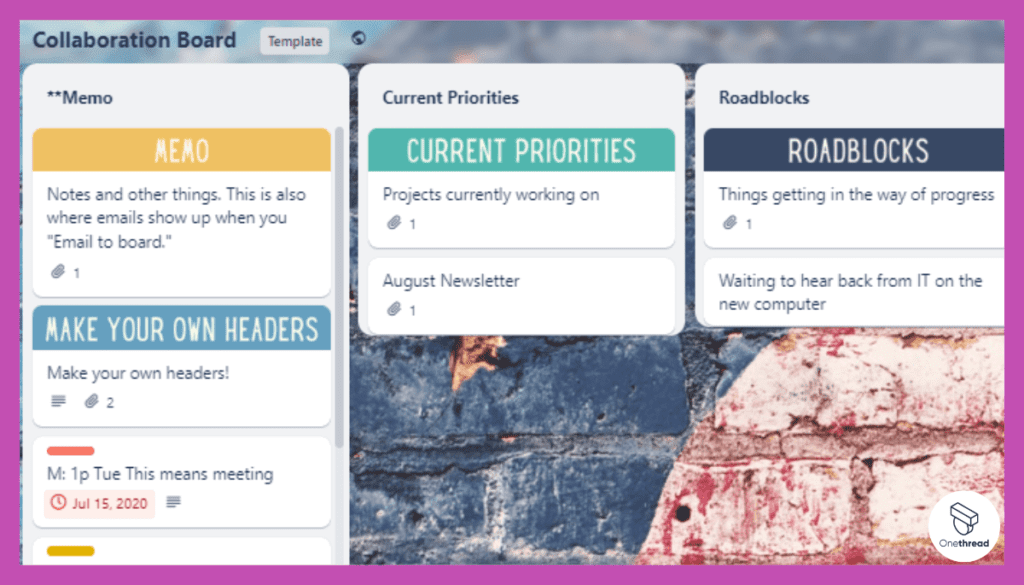
Trello makes it easy to collaborate with team members. You can assign tasks, add comments, and even integrate with other tools like Slack and Google Drive.
Integration
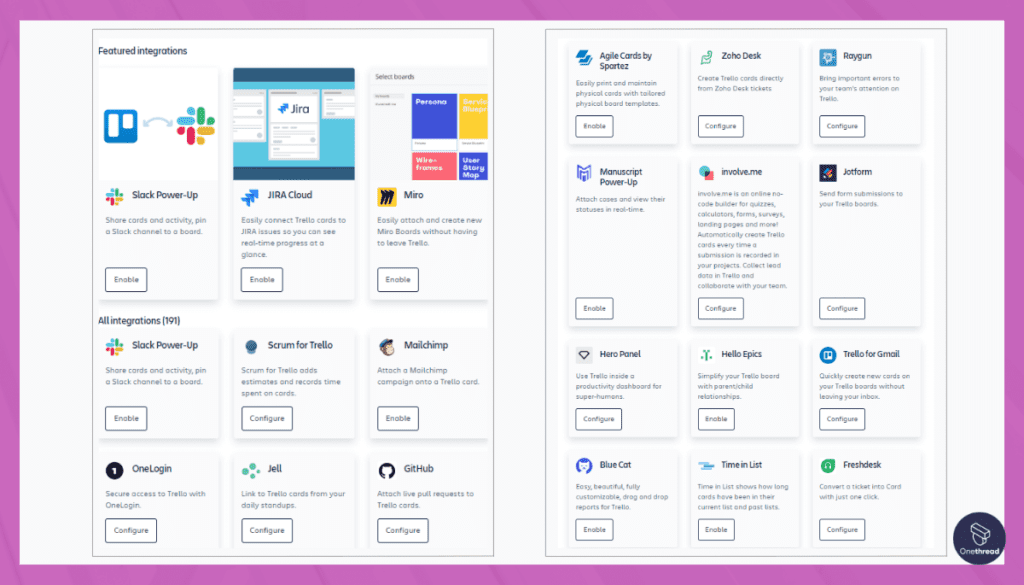
Trello has a robust set of integrations with other software, making it adaptable to many workflows.
Pros
- Simple and intuitive design.
- Great for visualizing project progress.
- Good integration with other tools.
Cons
- It can be too simple for complex project management.
- The interface can get cluttered with too many cards.
Pricing Plans:
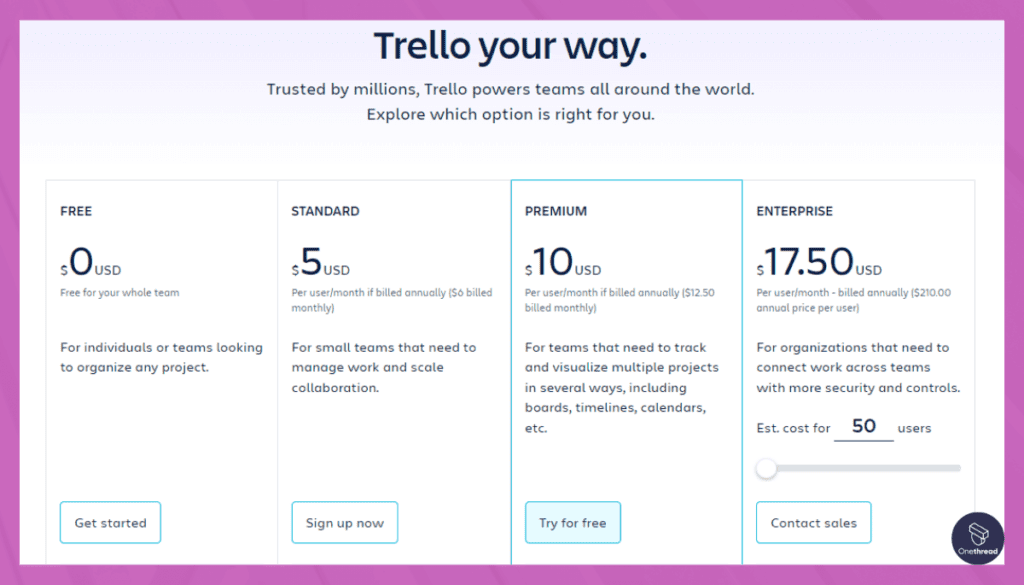
Trello offers a free plan for individuals and small teams, while its premium plans (Business Class and Enterprise) start at $10 per user/month and offer more features such as larger attachment limits, priority support, and advanced automation.
Customer Rating
- G2: 4.3 out of 5 stars (based on 4,000+ reviews).
- Capterra: 4.5 out of 5 stars (based on 18,000+ reviews).
User Review
Trello is a popular choice for project management, especially for smaller teams or projects that don’t require the full suite of CRM functionalities found in Microsoft Dynamics 365.
Its simple, visual approach makes it accessible and adaptable, but it may not be the right solution for businesses seeking a robust CRM system. The decision to use Trello over Microsoft Dynamics 365 would depend on the specific needs and priorities of the business.
Is Trello Better than Microsoft Dynamics 365?
Trello and Microsoft Dynamics 365 serve different purposes; Trello is a visual project management tool that helps teams organize tasks, while Microsoft Dynamics 365 is a time-tracking tool that assists in monitoring work hours.
Trello’s strength lies in its ability to visualize and manage projects, whereas Microsoft Dynamics 365 focuses on tracking time and productivity. The choice between the two depends on the specific needs of the user, such as project management versus time monitoring.
4. Zoho CRM
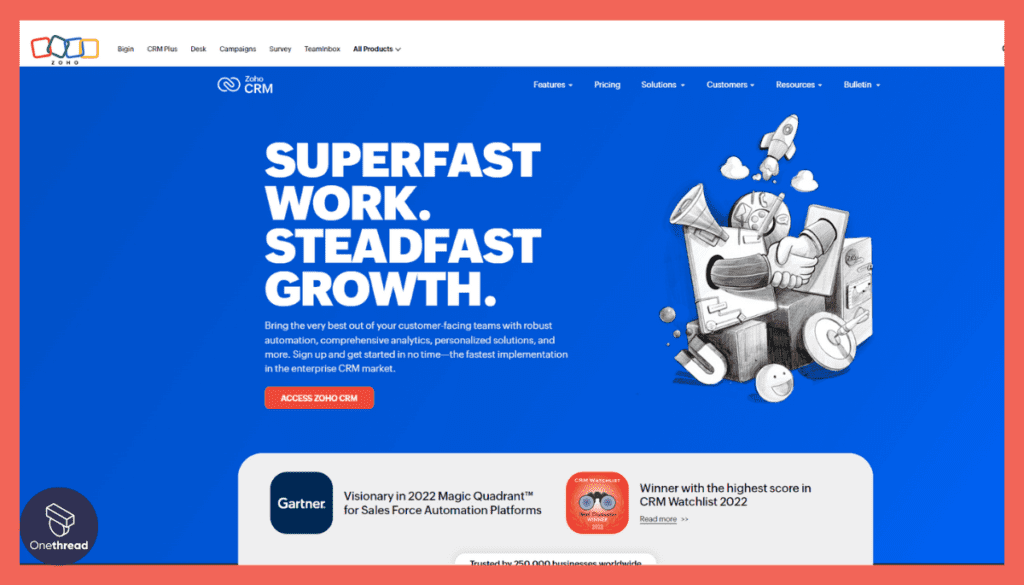
Zoho CRM is a cloud-based customer relationship management platform designed to help businesses engage with customers, automate sales processes, and improve overall efficiency.
Offering features such as lead and contact management, deal tracking, email automation, and in-depth analytics, Zoho CRM helps businesses of all sizes cultivate customer relationships and drive growth. With its intuitive interface and customizable modules, users can tailor the platform to their specific needs.
Integration with other Zoho products and third-party applications enhances its versatility. Zoho CRM’s mobile app ensures that sales teams can access critical information on the go, making it a valuable tool for modern, agile businesses looking to streamline their sales operations and improve customer engagement.
Key Features
Multichannel Communication
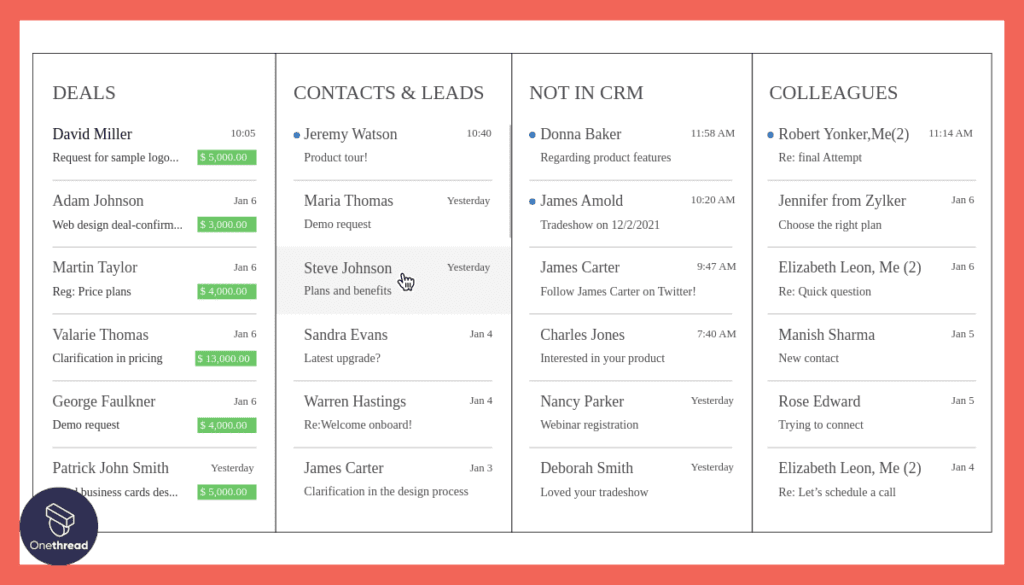
Zoho CRM provides multichannel support, allowing you to reach your customers through email, live chat, phone, and social media from one centralized platform.
Sales Force Automation
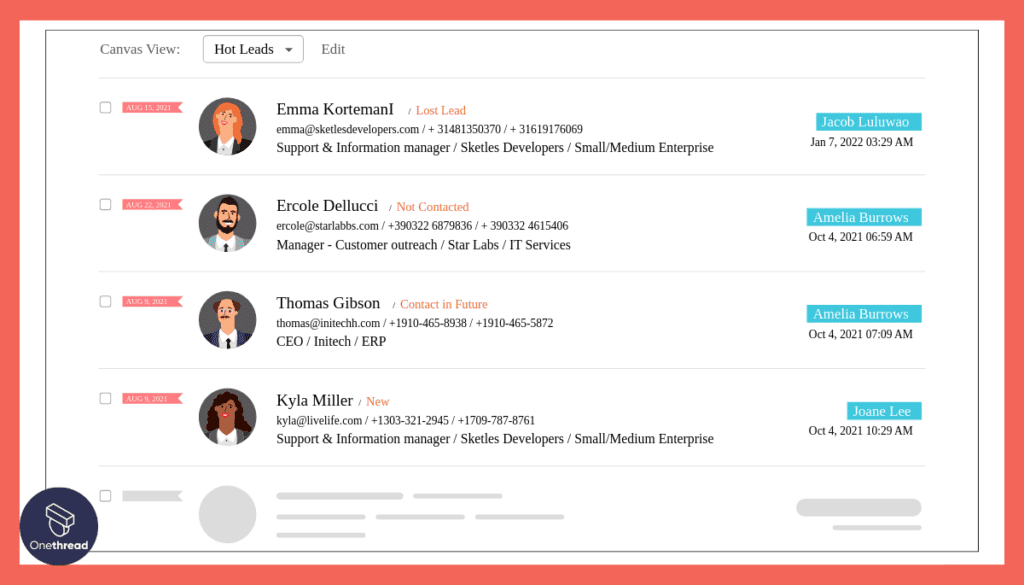
Zoho CRM streamlines your routine sales tasks, removing the need for manual intervention. It uses automation to handle your lead generation, deal management, contact management, and sales forecasting, making your sales process more efficient.
Analytics and Reporting
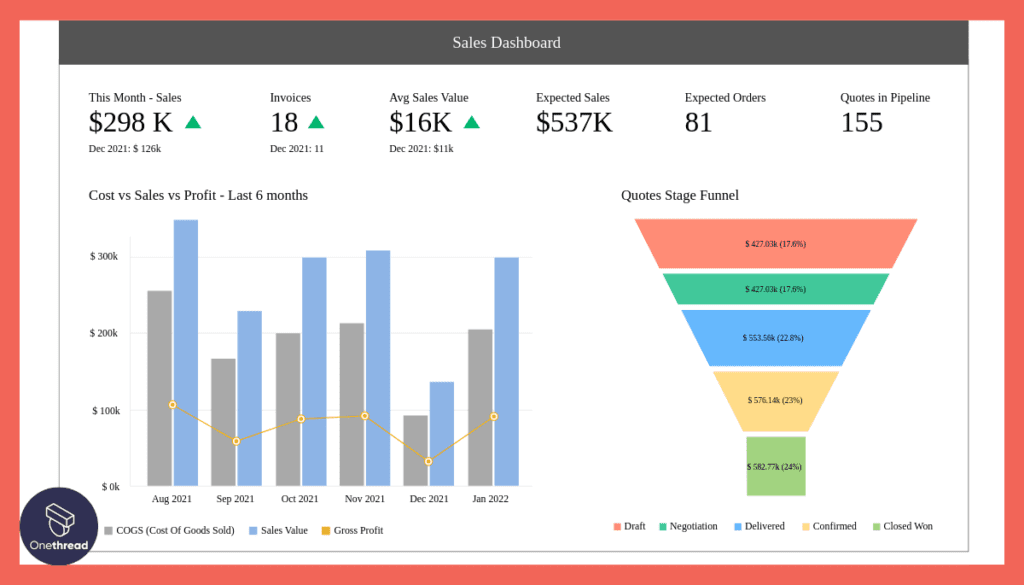
The platform offers robust analytics and customizable reports that provide actionable insights. These data-driven insights can guide decision-making and strategy formulation.
AI Assistant – Zia
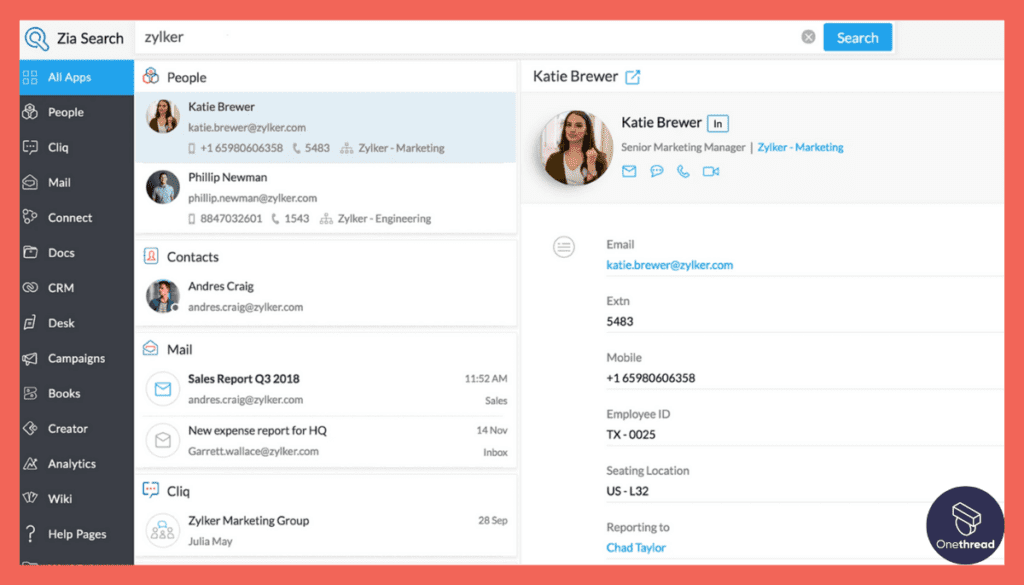
Zoho CRM comes with an AI-powered assistant, Zia, which can predict trends, anomalies, and patterns, helping you make smarter business decisions.
Pros:
- User-friendly interface.
- Extensive integration capabilities.
- High customization options.
Cons:
- Steep learning curve for beginners.
- Certain advanced features are only available in the higher-tier plans.
Pricing Plans
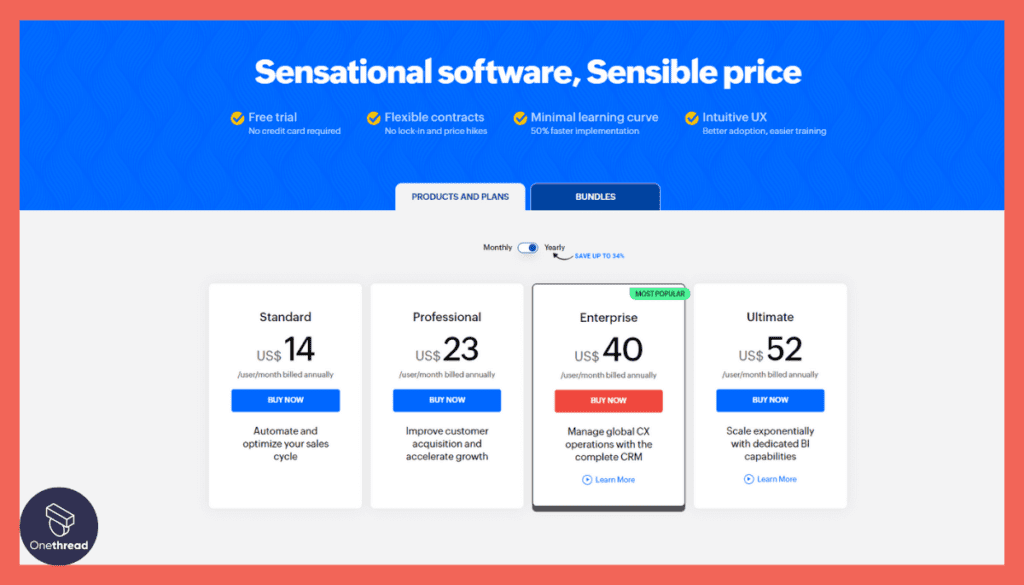
Zoho CRM offers a free version and four paid plans: Standard ($14/user/month), Professional ($23/user/month), Enterprise ($40/user/month), and Ultimate ($52/user/month).
Customer Ratings
- G2: 4.0 out of 5 stars.
- Capterra: 4.2 out of 5 stars.
Reviews
Users have praised Zoho CRM for its customizability and comprehensive set of features. The robust integration options with other Zoho products and third-party apps are also highly appreciated. Some users found the system a bit complex initially, but overall, the feedback is positive, with many customers finding it to be a value-for-money CRM solution.
Please note that for the most up-to-date ratings and reviews, you should visit the official G2 and Capterra websites.
Is Zoho CRM Better than Microsoft Dynamics 365?
Zoho CRM and Microsoft Dynamics 365 are tailored for different business needs. Zoho CRM focuses on customer relationship management, offering features like sales automation, analytics, and multichannel communication. Microsoft Dynamics 365, on the other hand, is a time-tracking tool designed to manage project hours and team productivity.
Therefore, comparing the two is like comparing apples to oranges, as they serve distinct functions and are aimed at addressing unique aspects of business operations.
5. HubSpot CRM
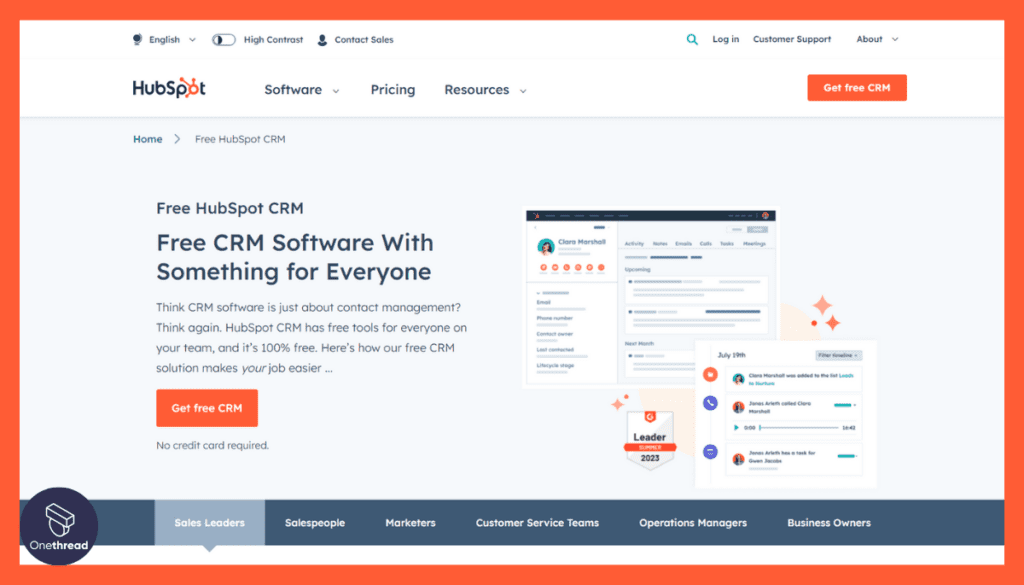
HubSpot CRM is a user-friendly, cloud-based customer relationship management system that streamlines sales, marketing, and customer service processes. Designed for businesses of all sizes, HubSpot CRM provides tools to manage leads, track customer interactions, and organize data in a centralized hub.
Its key features include contact and lead management, email tracking, reporting analytics, and integration with various marketing tools. With automation capabilities, it helps to reduce manual tasks, allowing teams to focus on building relationships and closing deals.
The platform’s intuitive design and extensive resources make it accessible to new users. As part of HubSpot’s comprehensive suite of sales and marketing tools, it enables seamless collaboration across teams and offers scalable solutions for growth.
Features
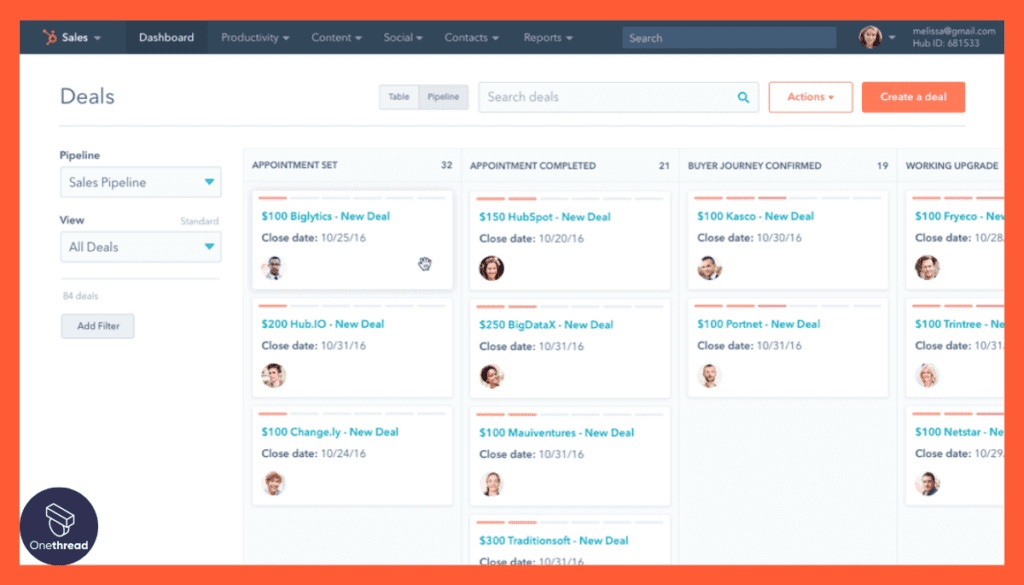
1. Contact Management:
HubSpot CRM offers an intuitive way to manage and track interactions with clients. All communications and data are stored in a clean and straightforward dashboard.
Marketing Automation
HubSpot provides robust marketing automation tools to create and manage marketing campaigns seamlessly.
Sales Forecasting
With accurate sales forecasting, businesses can plan ahead and make informed decisions.
Integration
HubSpot’s extensive integration capabilities allow it to work in conjunction with a wide variety of third-party apps and systems.
Free Tier Availability
One of the standout features of HubSpot CRM is its free tier, allowing businesses of all sizes to explore its functionality.
Pros & Cons
Pros:
- User-friendly interface
- Extensive customization options
- Strong community and support
- Wide range of integrations
Cons:
- Some advanced features may require paid plans
- Limited capabilities compared to more extensive CRM systems
Pricing Plans
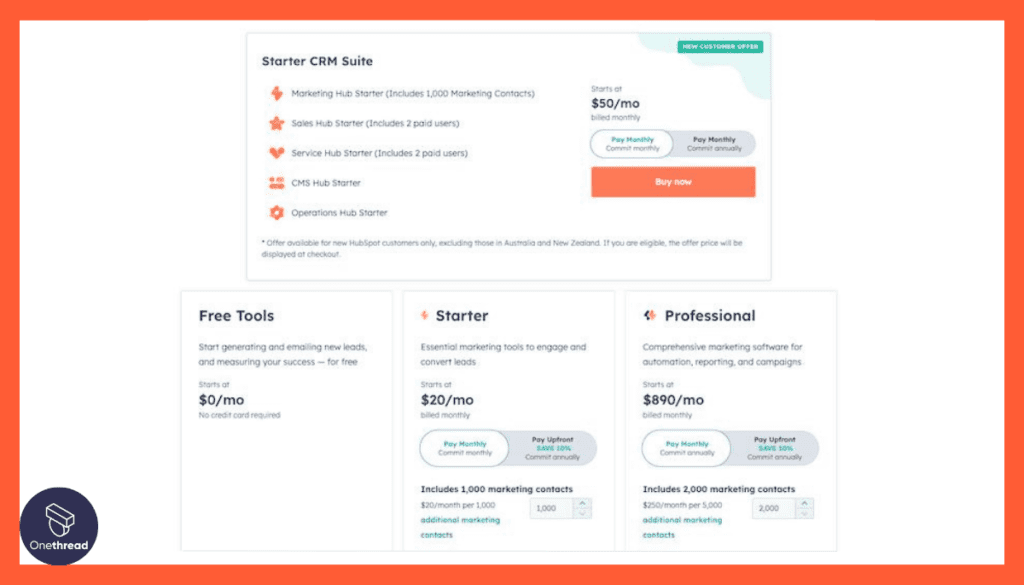
HubSpot offers a free version and several paid plans, starting from $50 per user per month, with additional features and support available according to the chosen plan.
Customer Rating
- G2: 4.3/5 stars, based on 2,569 reviews
- Capterra: 4.3/5 stars, based on 3,183 reviews
Review
HubSpot CRM is celebrated for its ease of use and adaptability. Users appreciate the customizable dashboards and extensive integration capabilities. While some may find limitations in its advanced functionalities, especially compared to comprehensive solutions like Microsoft Dynamics 365, HubSpot’s CRM free tier and simplicity make it a compelling alternative for many businesses.
It’s particularly well-suited for small to medium-sized businesses or those just starting with CRM.
Is HubSpot CRM Better than Microsoft Dynamics 365?
HubSpot CRM and Microsoft Dynamics 365 serve different purposes; HubSpot CRM focuses on customer relationship management, offering features like contact tracking, marketing automation, and sales forecasting, while Microsoft Dynamics 365 is a time-tracking tool used to measure work hours.
Comparing the two is like comparing apples to oranges, as they are designed for separate functions and can even be used in conjunction with each other, rather than one being superior to the other.
6. Pipedrive
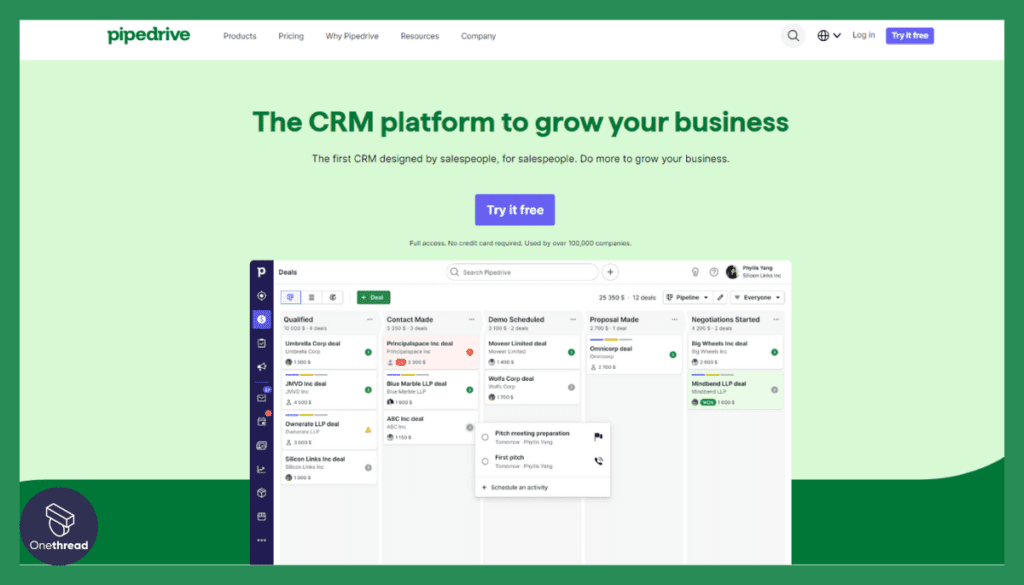
Pipedrive is a sales-focused customer relationship management (CRM) tool designed to help sales teams manage leads and deals. It offers a clear visual interface that provides an overview of the sales pipeline, allowing users to track progress and prioritize tasks.
Key features include email integration, contact management, customizable pipelines, and automation of repetitive administrative tasks. Pipedrive also offers robust reporting and analytics tools, giving insights into sales performance and forecasting.
Its integration capabilities with other tools make it a versatile option for various business needs. Pipedrive’s focus on simplicity and ease-of-use makes it a popular choice for sales professionals looking to streamline their workflow and increase efficiency.
Features
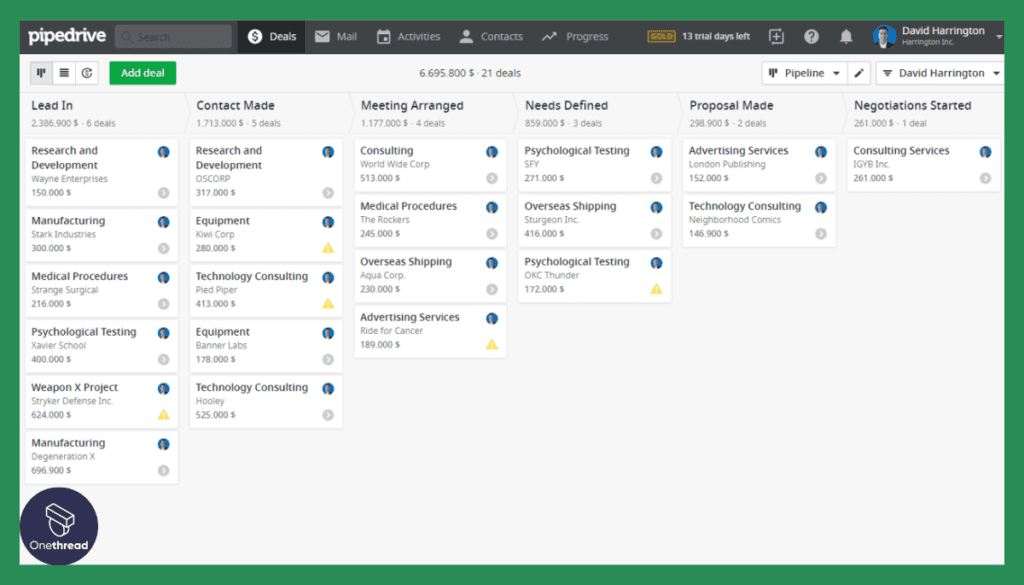
Sales Process Management
Pipedrive organizes the sales process into stages, making it easy for sales teams to track and manage leads and deals. The customizable pipeline ensures adaptability to various business needs.
Activity and Communication Tracking
Monitor every email, call, and activity within the platform. This feature helps in understanding customer interactions and aids in decision-making.
Automation and Integration
With automated workflow and integration with various third-party tools, Pipedrive simplifies repetitive tasks and enhances the overall functionality of the CRM system.
Analytics and Reporting
Gain insights through detailed reports and analytics. Customizable dashboards enable you to focus on vital metrics and make data-driven decisions.
Pros & Cons
Pros:
- Intuitive interface.
- Flexible pricing.
- Strong mobile app support.
Cons:
- Limited customization compared to Microsoft Dynamics 365.
- May lack advanced features for larger enterprises.
Pricing Plans
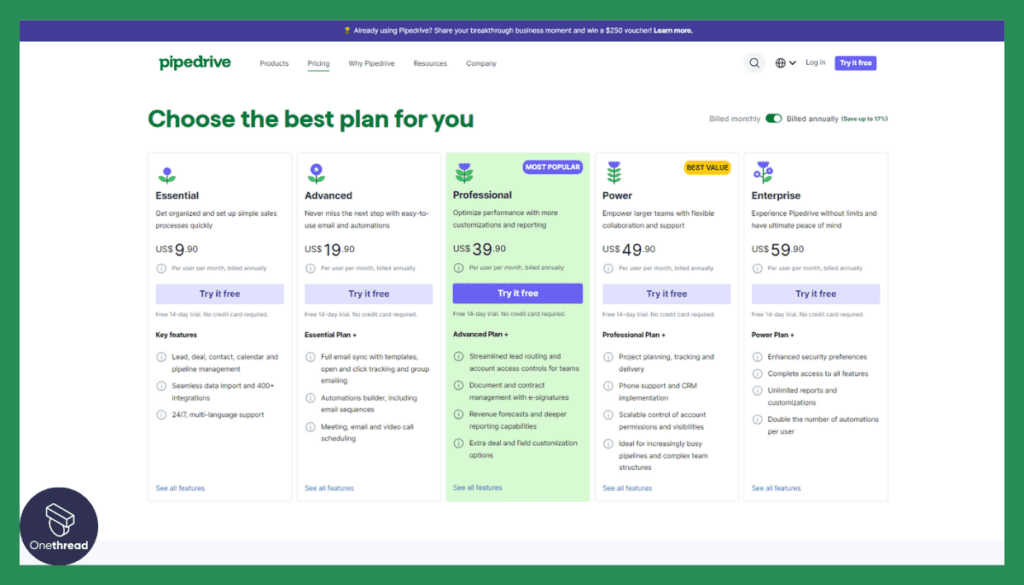
Pipedrive offers various pricing tiers designed to suit different business needs:
- Essential: $12.50 per user/month
- Advanced: $24.90 per user/month
- Professional: $49.90 per user/month
- Enterprise: Custom pricing
Customer Rating
- G2: 4.3 out of 5 stars (based on over 2,300 reviews)
- Capterra: 4.5 out of 5 stars (based on over 2,000 reviews)
Review
Pipedrive is celebrated for its ease of use, making it accessible for smaller businesses and those new to CRM. Its focus on sales and lead management sets it apart from more comprehensive solutions like Microsoft Dynamics 365. However, those seeking extensive customization or advanced enterprise-level features may find Pipedrive somewhat lacking.
Pipedrive is a compelling option for sales-focused organizations looking for a more streamlined and cost-effective alternative to Microsoft Dynamics 365. Its straightforward approach and adaptability to various business needs make it a strong contender in the CRM landscape.
Is Pipedrive Better than Microsoft Dynamics 365?
Pipedrive excels in user-friendly design and is geared towards sales teams who require a straightforward CRM solution. Microsoft Dynamics 365, on the other hand, provides a more comprehensive suite with diverse functions that can be tailored to larger, complex organizations.
While Pipedrive emphasizes sales process simplicity, Dynamics 365 offers extensive integrations and customizable solutions. The selection between the two hinges on the specific demands and size of the organization.
7. Freshsales
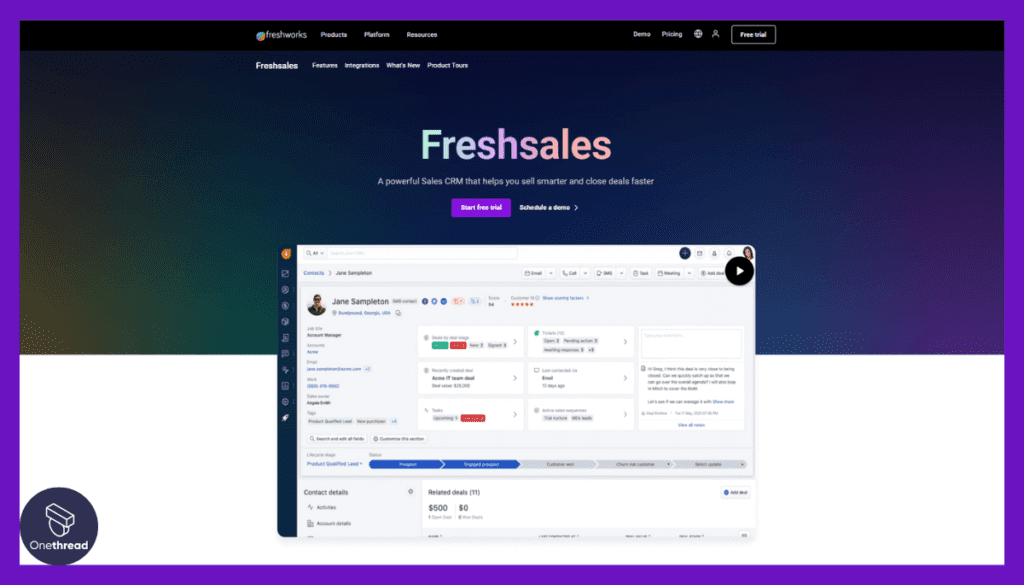
Freshsales is a customer relationship management (CRM) software designed to streamline sales processes. It provides a 360-degree view of customers, tracking interactions and capturing leads through various channels.
With features like lead scoring, built-in email and phone, and automated workflows, Freshsales helps sales teams prioritize leads and close deals faster. The intuitive dashboard offers real-time analytics and reporting, allowing for quick decision-making and goal tracking.
Freshsales integrates easily with other tools, offering a flexible platform that adapts to different business needs. Its user-friendly interface and robust customer support options make Freshsales a solid choice for businesses looking to enhance customer engagement and drive sales growth.
Features
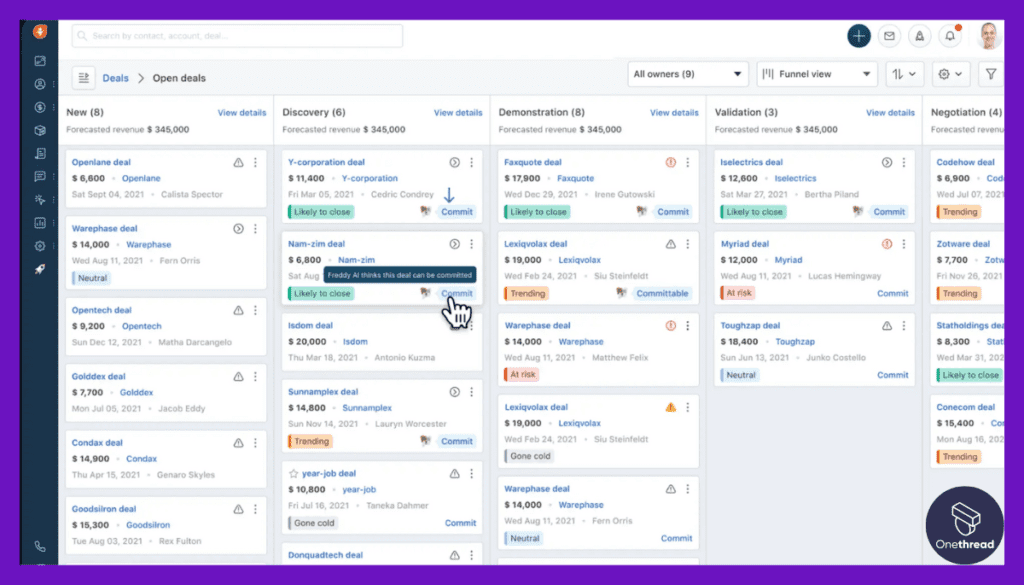
Lead Scoring
Freshsales offers lead scoring which helps sales teams to prioritize leads based on behavior and demographics.
Email Tracking
Get real-time alerts when emails are opened and links are clicked, allowing immediate follow-up.
Built-in Phone
Make calls directly from the CRM with automatic logging, recording, and analytics.
Sales Campaigns
Plan, execute, and monitor email campaigns to increase engagement and conversion rates.
Integrations
Seamlessly integrate with other Freshworks products and various third-party applications.
Pros & Cons
Pros:
- User-friendly interface
- Robust sales analytics
- Affordable pricing for small to medium-sized businesses
- Excellent customer support
Cons:
- Limited customization compared to Dynamics 365
- May lack some advanced features suited for large enterprises
Pricing Plans
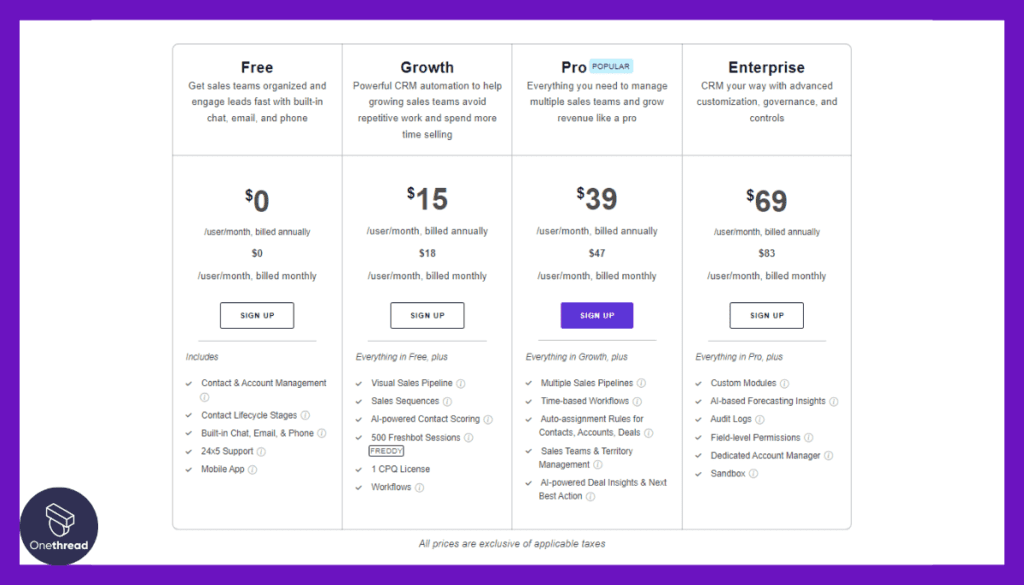
Freshsales offers four pricing tiers, ranging from a free tier to the Enterprise plan, which provides advanced features at $69 per user/month. Customized packages are also available to match specific needs.
Customer Rating
- G2: 4.3/5 (based on 550+ reviews)
- Capterra: 4.4/5 (based on 500+ reviews)
Review
Freshsales is often praised for its ease of use and accessibility, especially for small to medium-sized businesses. It offers many essential features for managing sales processes. However, some users note that it lacks the extensive customization and scalability found in Microsoft Dynamics 365.
In conclusion, Freshsales serves as an attractive alternative for businesses seeking a simple and effective CRM system. While it may not match the exhaustive capabilities of Dynamics 365, its user-centric approach and affordability make it an appealing choice for many organizations.
Is Freshsales Better than Microsoft Dynamics 365?
Freshsales offers a user-friendly interface with robust sales analytics, especially appealing to small to medium-sized businesses. While Microsoft Dynamics 365 provides extensive customization and scalability suited for larger enterprises, Freshsales emphasizes simplicity and affordability.
The choice between the two may hinge on specific business needs, with Freshsales favoring streamlined operations and Dynamics 365 catering to complex organizational requirements.
8. SugarCRM
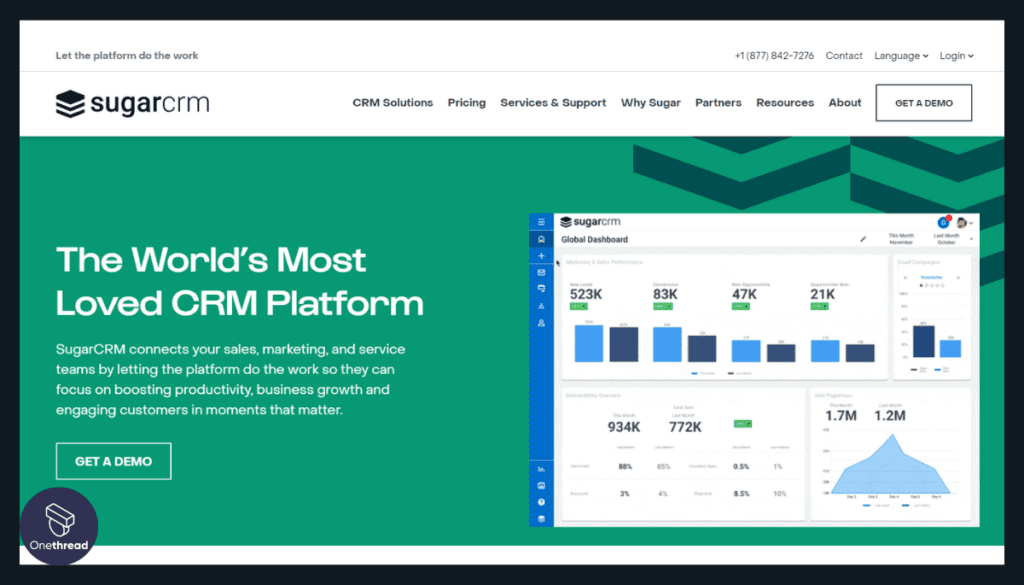
SugarCRM is a flexible customer relationship management (CRM) platform tailored to help businesses automate sales, marketing, and customer service processes.
It provides a centralized location for managing leads, contacts, and opportunities, enabling teams to collaborate effectively. With its powerful analytics and reporting tools, SugarCRM helps businesses gain insights into customer behavior and sales trends. The platform offers customizable modules that fit various industry needs, and its open-source nature allows for extensive integration with other tools.
SugarCRM focuses on providing a seamless user experience with its intuitive interface, allowing teams to focus more on building relationships with customers and less on administrative tasks. Its commitment to innovation and customer success has made it a popular choice among businesses of all sizes.
Features
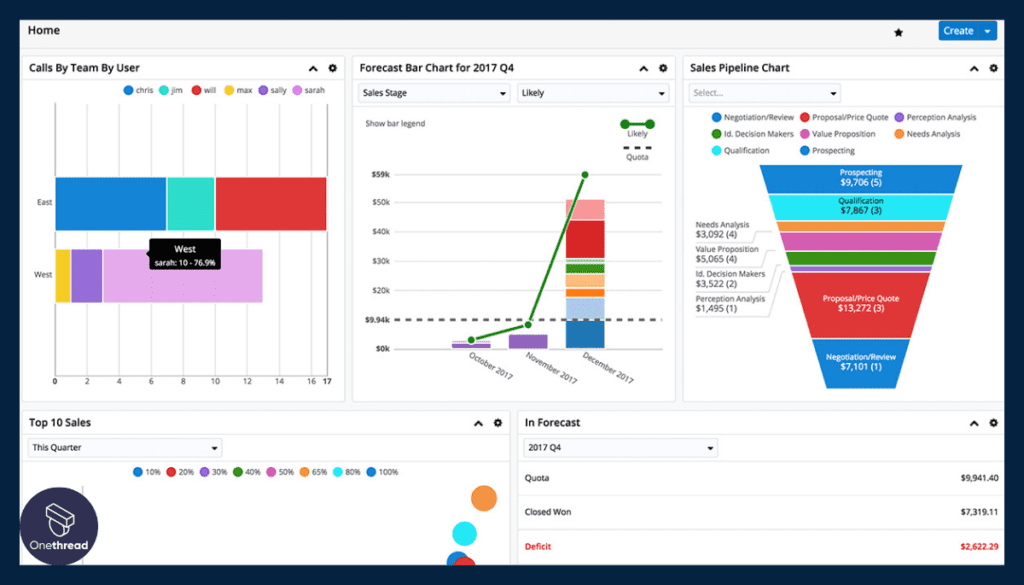
Customization
SugarCRM provides robust customization options, allowing users to tailor the platform to their specific business needs. This includes creating custom fields, modules, and workflows.
Automation
With advanced automation capabilities, SugarCRM enables users to set up automated workflows, reducing manual work and increasing efficiency.
Analytics and Reporting
Powerful analytics and reporting tools in SugarCRM help businesses make data-driven decisions. It offers real-time insights, graphical dashboards, and detailed reports.
Integrations
SugarCRM supports integration with various third-party applications such as email marketing platforms, social media channels, and accounting software, enhancing functionality.
Mobile Accessibility
The mobile-friendly design allows users to access the platform on the go, ensuring that they can keep track of leads, opportunities, and customer interactions from anywhere.
Pros & Cons
Pros:
- User-friendly interface
- High customization possibilities
- Strong community and developer support
- Affordable pricing
Cons:
- Steeper learning curve for complex features
- Some users may find customer support less responsive
Pricing Plans
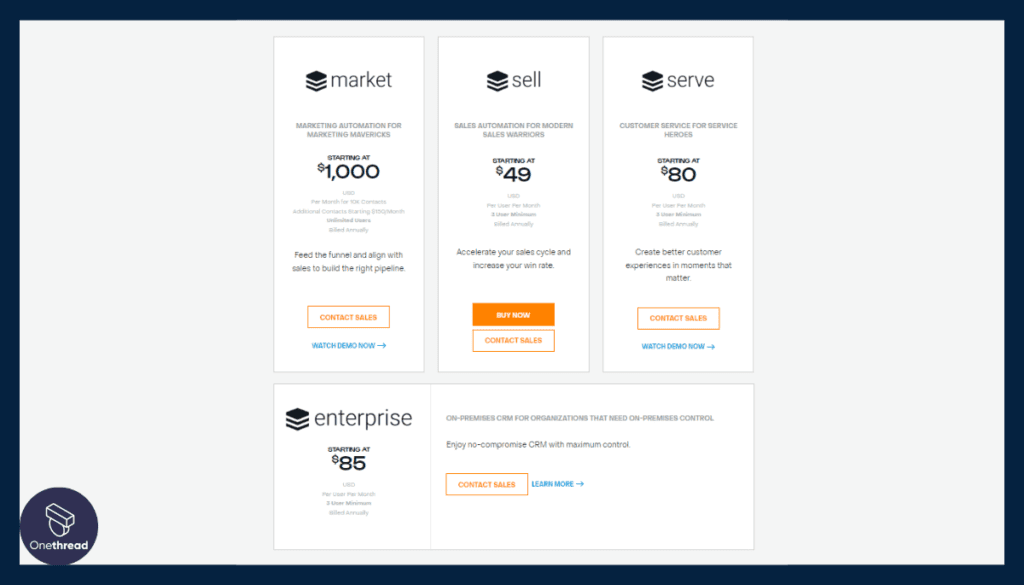
SugarCRM offers different pricing tiers depending on the features and number of users. They include:
- Sugar Professional: Starting at $40/user per month
- Sugar Enterprise: Starting at $65/user per month
- Sugar Sell: Custom pricing available
Customer Rating
- G2 Rating: 4.0 out of 5 stars
- Capterra Rating: 4.2 out of 5 stars
Review
Customers generally appreciate SugarCRM’s flexibility and customization options. While some users have noted challenges in mastering advanced functionalities, the overall sentiment leans towards satisfaction with the platform’s capabilities.
The affordability of SugarCRM compared to Microsoft Dynamics 365, along with its rich feature set, makes it a worthy alternative for businesses seeking a dynamic CRM solution.
Is SugarCRM Better than Microsoft Dynamics 365?
SugarCRM offers high customization, advanced automation, and robust analytics, catering to businesses seeking an agile and cost-effective solution. While Microsoft Dynamics 365 provides comprehensive integration and AI-driven insights, SugarCRM’s user-friendly interface and affordable pricing plans might make it a more suitable option for some organizations.
Preferences between the two may depend on specific business needs, such as customization requirements, budget constraints, or a preference for a particular user experience.
9. Nimble CRM
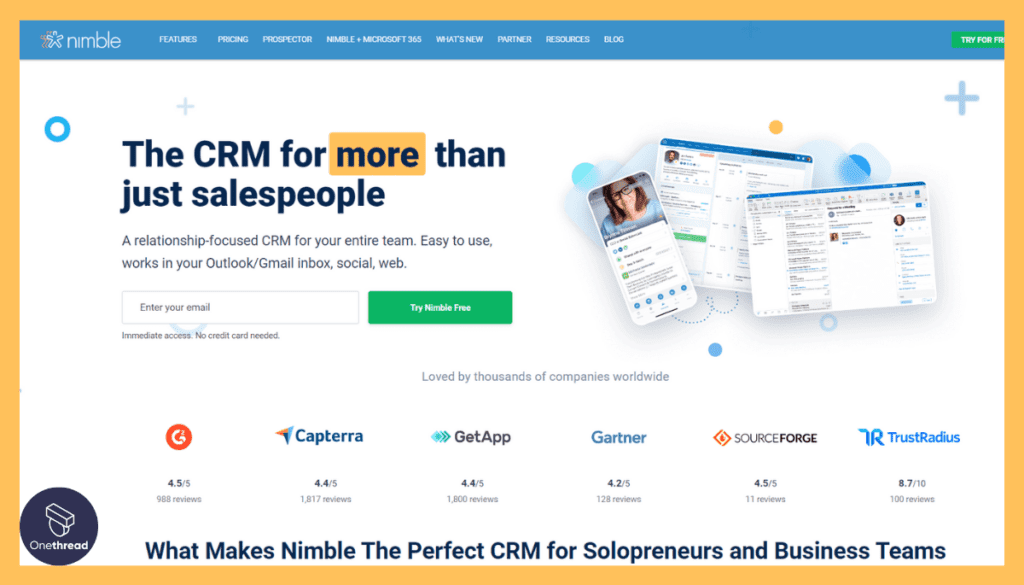
Nimble CRM is a user-friendly customer relationship management (CRM) system designed for small businesses and professionals. It emphasizes ease of use and social media integrations, allowing users to gather information about their contacts from various online sources.
By consolidating details from social networks, email, and other online interactions, Nimble provides a comprehensive view of each contact. The platform also offers features like task management, calendar syncing, and sales automation to streamline daily operations.
With its mobile responsiveness, users can access information on the go, enhancing flexibility and productivity. Nimble CRM’s main focus is on simplicity and relationship building, making it an attractive option for those looking to enhance personal connections with customers without the complexity of a larger CRM system.
Features
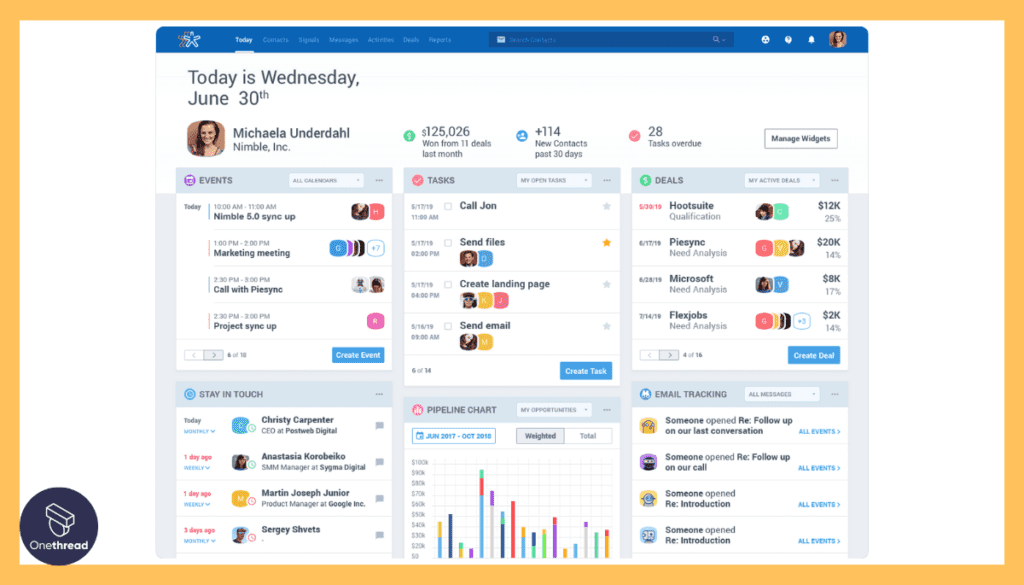
Contact Management
Nimble collects information from various online sources, providing a comprehensive view of contacts. It integrates data from social media and emails, ensuring that user profiles are complete and up-to-date.
Social Media Integration
Nimble integrates with major social networks, offering insights into customers’ social media behavior. This integration helps in targeted marketing and building deeper connections with customers.
Sales Automation
Nimble offers automation tools that streamline sales processes, including tracking, lead management, and follow-ups, saving time and enhancing productivity.
Email Tracking
The platform allows tracking of email opens and clicks, enabling a better understanding of customer engagement.
Pros & Cons
Pros:
- Intuitive user interface
- Affordable pricing
- Strong social media integration
Cons:
- Limited advanced features compared to some enterprise-level solutions
- May not suit very large businesses
Pricing Plans
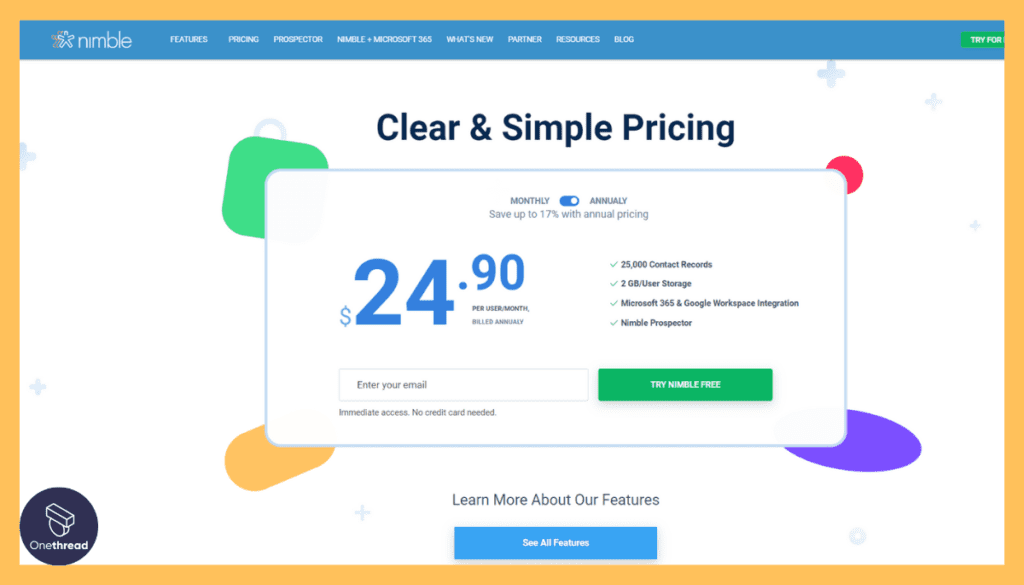
Nimble offers different pricing tiers, starting from a basic plan suitable for small businesses, up to more advanced options for larger teams.
Free Trial:
- Try before you buy, typically 14 days.
Contact Plan:
- Price: Around $12 per user per month (billed annually).
- Basic features, great for individuals.
Business Plan:
- Price: Around $25 per user per month (billed annually).
- More features, tailored for teams and growing businesses.
Enterprise Plan:
- Price varies, custom to the organization.
- Advanced features, best for larger businesses.
Customer Rating
- G2: 4.1/5
- Capterra: 4.2/5
Review
Nimble CRM has received praise for its simplicity, affordability, and effectiveness in managing contacts and integrating social media. While it might not offer the extensive capabilities of Microsoft Dynamics 365, its user-friendly interface and targeted features make it a strong option for SMBs(Small and Medium Businesses). The cons mainly surround its limitations in advanced functionality, which might not impact smaller organizations.
Is Nimble CRM Better than Microsoft Dynamics 365?
Nimble CRM’s user-friendly interface, social media integration, and cost-effectiveness make it a compelling option for small to medium-sized businesses seeking a simpler CRM solution.
However, Microsoft Dynamics 365’s comprehensive features, scalability, and AI-driven insights cater to larger enterprises with more complex needs. The choice between the two depends on the organization’s size, requirements, and budget.
10. Insightly CRM
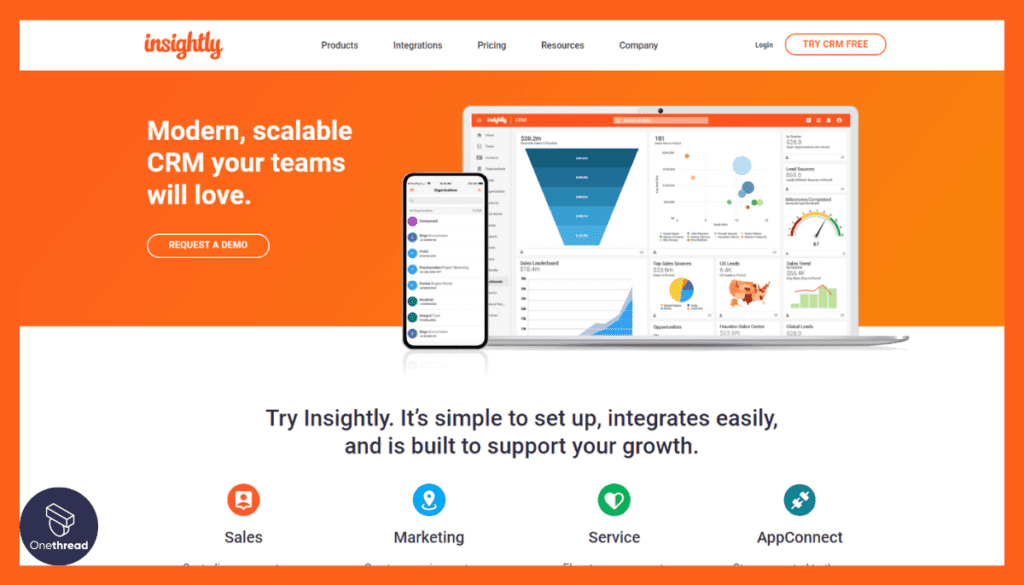
Insightly CRM is a cloud-based platform designed to help businesses manage customer relationships and project lifecycles. It’s particularly suited for small to mid-sized companies, offering tools that focus on sales, relationship linking, project insights, and email tracking.
Insightly integrates well with popular applications like Gmail and Microsoft Office, allowing a seamless flow of information. The platform provides visual relationship tracking, making it easy to see how contacts are connected to each other and to various projects or opportunities. This visual insight helps businesses to better target their marketing and sales efforts.
With customization options, mobile accessibility, and robust reporting features, Insightly CRM serves as a comprehensive tool for companies looking to improve their customer relationships and business efficiency.
Features
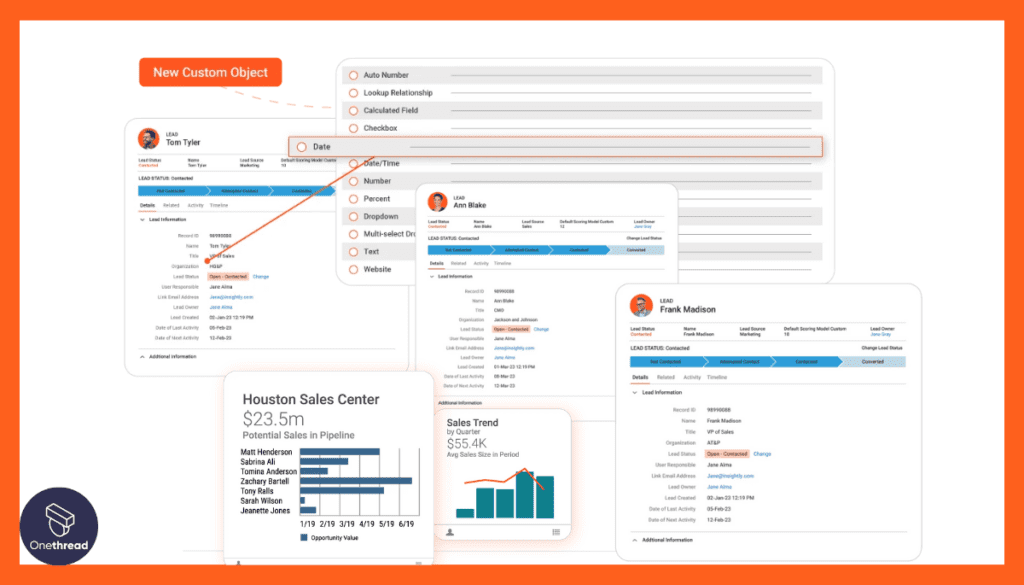
Contact Management
Insightly provides a centralized database for managing customer contacts, communication history, and interactions. This helps sales and support teams stay organized and better understand their customers.
Project Management
With integrated project management capabilities, Insightly enables teams to collaborate, assign tasks, and track project progress directly within the CRM platform.
Email Tracking
Insightly’s email tracking feature allows users to monitor email opens, link clicks, and responses, providing valuable insights into customer engagement.
Sales Pipeline Management
Insightly offers a visual representation of the sales pipeline, enabling sales teams to track leads, opportunities, and deals at various stages of the sales process.
Reporting and Dashboards
Insightly’s reporting and dashboard tools provide real-time insights into key performance metrics, helping businesses make data-driven decisions.
Pros & Cons
Pros:
- Intuitive and user-friendly interface
- Affordable pricing plans for businesses of all sizes
- Effective contact and project management capabilities
- Integrates with various third-party applications
Cons:
- Some users find advanced customization options limited compared to Microsoft Dynamics 365
- Occasional system slowdown during peak usage periods
Pricing Plans
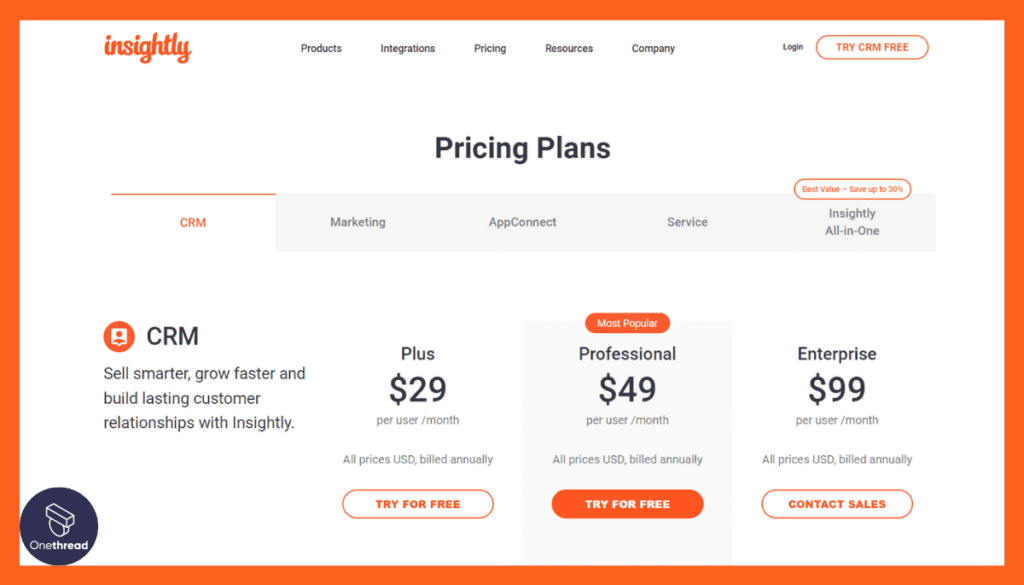
Insightly offers multiple pricing tiers to suit different business needs:
- Plus: Starting at $29/user per month
- Professional: Starting at $49/user per month
- Enterprise: Starting at $99/user per month
- Custom pricing available for large enterprises
Customer Rating
- G2 Rating: 4.1 out of 5 stars
- Capterra Rating: 4.1 out of 5 stars
Review
Customers appreciate Insightly’s user-friendly interface and its ability to effectively manage contacts, projects, and sales pipelines. The software’s affordability and range of features make it a compelling alternative to Microsoft Dynamics 365, particularly for small to medium-sized businesses.
While some users find certain customization options limited, the overall sentiment indicates that Insightly CRM is a valuable choice for businesses looking to improve their customer relationship management processes.
Is Insightly CRM Better than Microsoft Dynamics 365?
Insightly CRM’s user-friendly interface, affordability, and effective contact and project management capabilities make it a strong choice for small to medium-sized businesses.
However, Microsoft Dynamics 365’s comprehensive features, scalability, and advanced customization options cater to larger enterprises with complex requirements. The decision between the two hinges on the organization’s size, specific needs, and budget considerations.
Conclusion
Choosing a Microsoft Dynamics 365 alternative requires careful consideration of your organization’s needs, budget, and operational context. Options like Onethread, Asana, Trello, Monday.com, Wrike, ClickUp, Teamwork, Smartsheet, Zoho Projects, and Jira each provide unique strengths.
Onethread’s affordability and intuitive interface make it a standout choice for SMEs. Asana, Trello, and Monday.com excel in task tracking and team collaboration. Wrike and ClickUp offer high customization, while Teamwork and Smartsheet provide comprehensive feature sets for varied use cases.
Each alternative offers a unique combination of features, integrations, and pricing models. Selecting the right one hinges on aligning these attributes with your specific project management requirements, ensuring optimal productivity and effectiveness.
FAQs
Which Microsoft Dynamics 365 alternative is the most affordable?
Many alternatives offer tiered pricing, including free versions with basic features. Onethread, Trello, Asana, and ClickUp all offer free versions. The most affordable for your needs will depend on your required features.
Which alternative to Microsoft Dynamics 365 is best for real-time collaboration?
While most alternatives offer real-time collaboration to some extent, Onethread, Asana, Trello, and Monday.com stand out for their robust collaboration features, such as built-in chat, file sharing, and commenting.
Is there an alternative to Microsoft Dynamics 365 that integrates well with other software?
Most alternatives offer integrations with popular tools. Onethread, for instance, integrates with Google Drive, Slack, and Zoom. Monday.com and Wrike also have wide-ranging integration capabilities.
Which alternative to Microsoft Dynamics 365 is best for software development teams?
Jira is widely recognized as a leading project management tool for software development teams due to its strong issue tracking, workflow mapping, and agile reporting capabilities.
Which Microsoft Dynamics 365 alternative is the easiest to use?
Ease of use can vary depending on user familiarity with similar tools. However, Onethread, Trello, and Asana are often praised for their user-friendly and intuitive interfaces.
